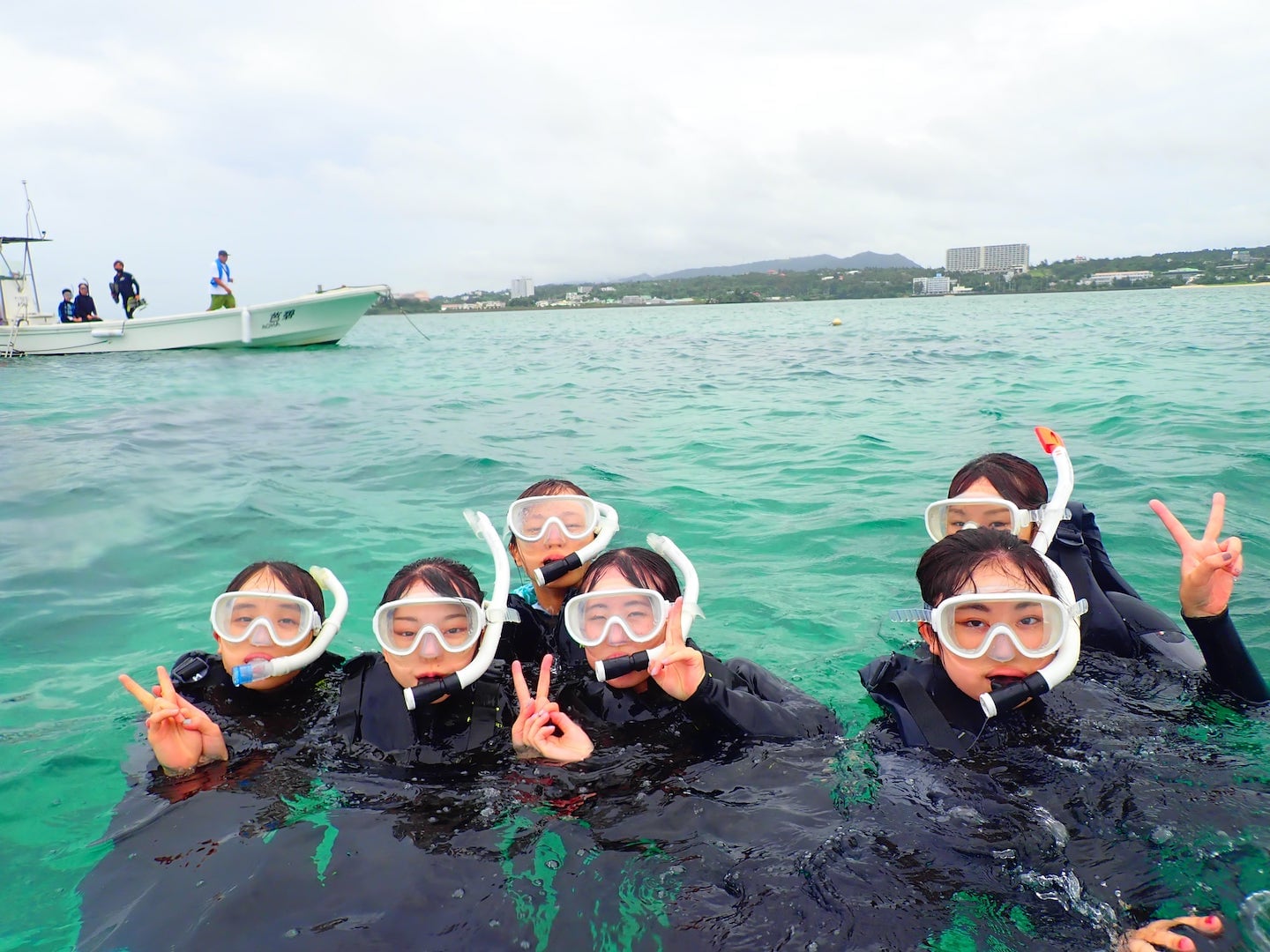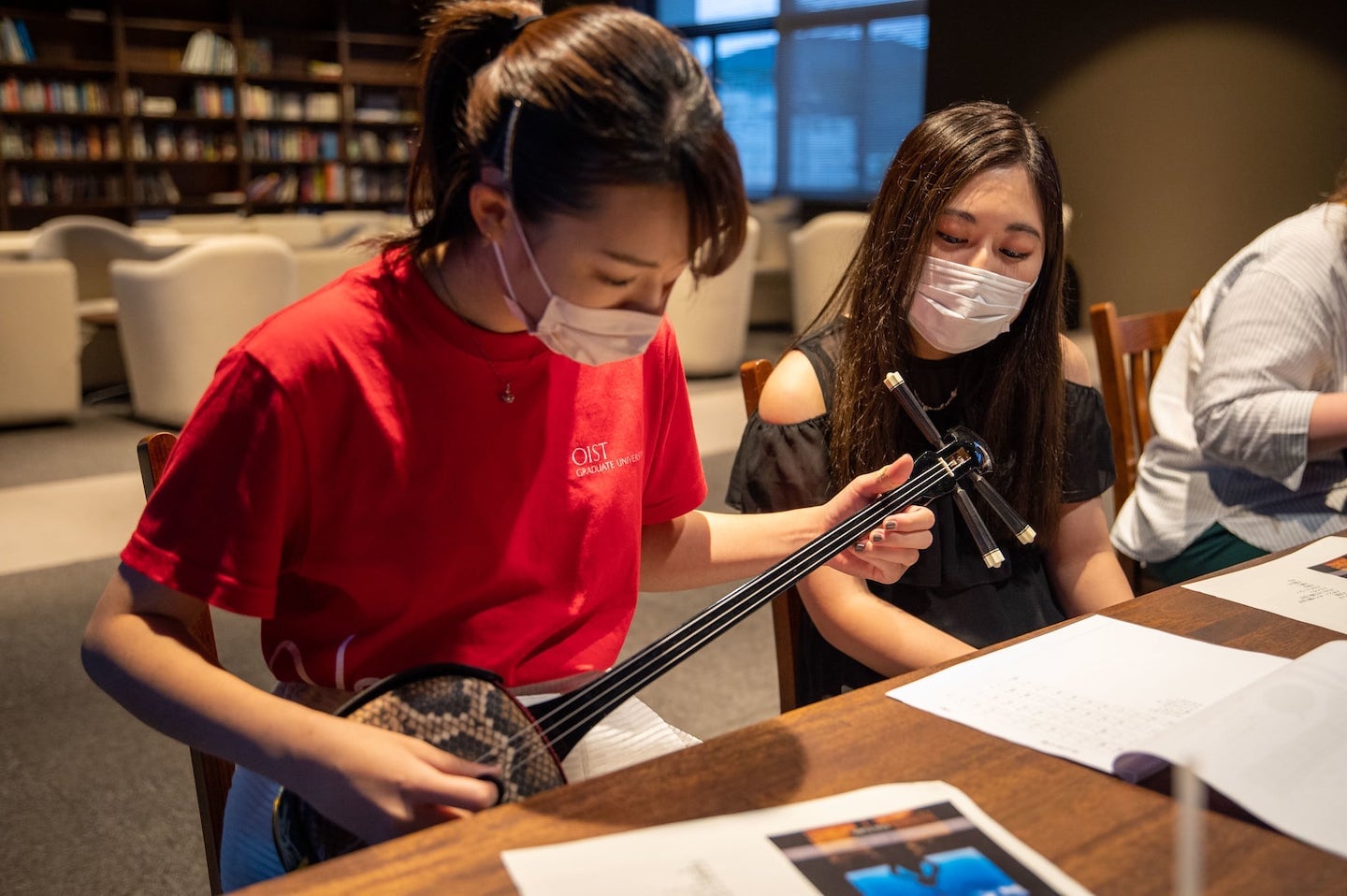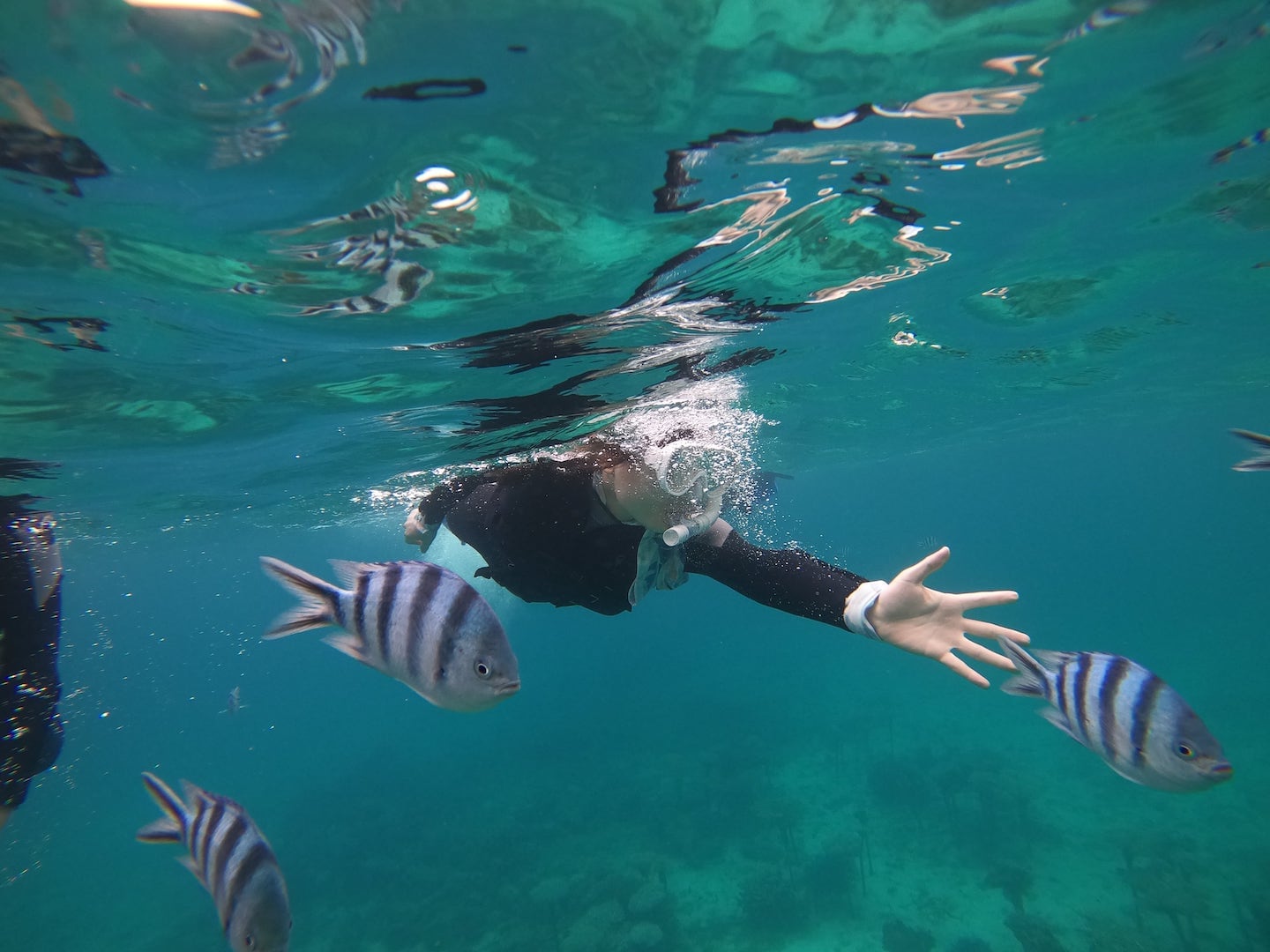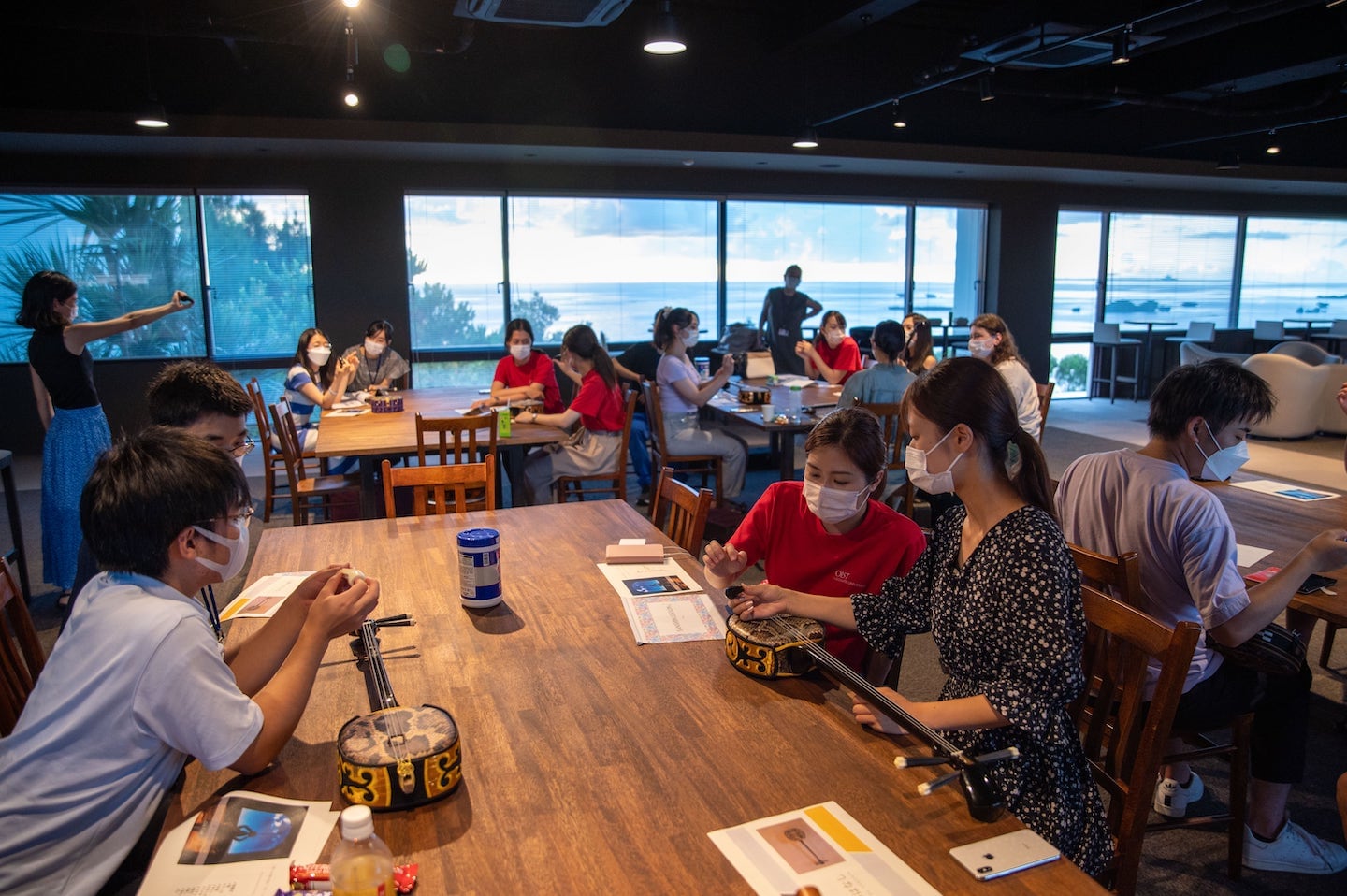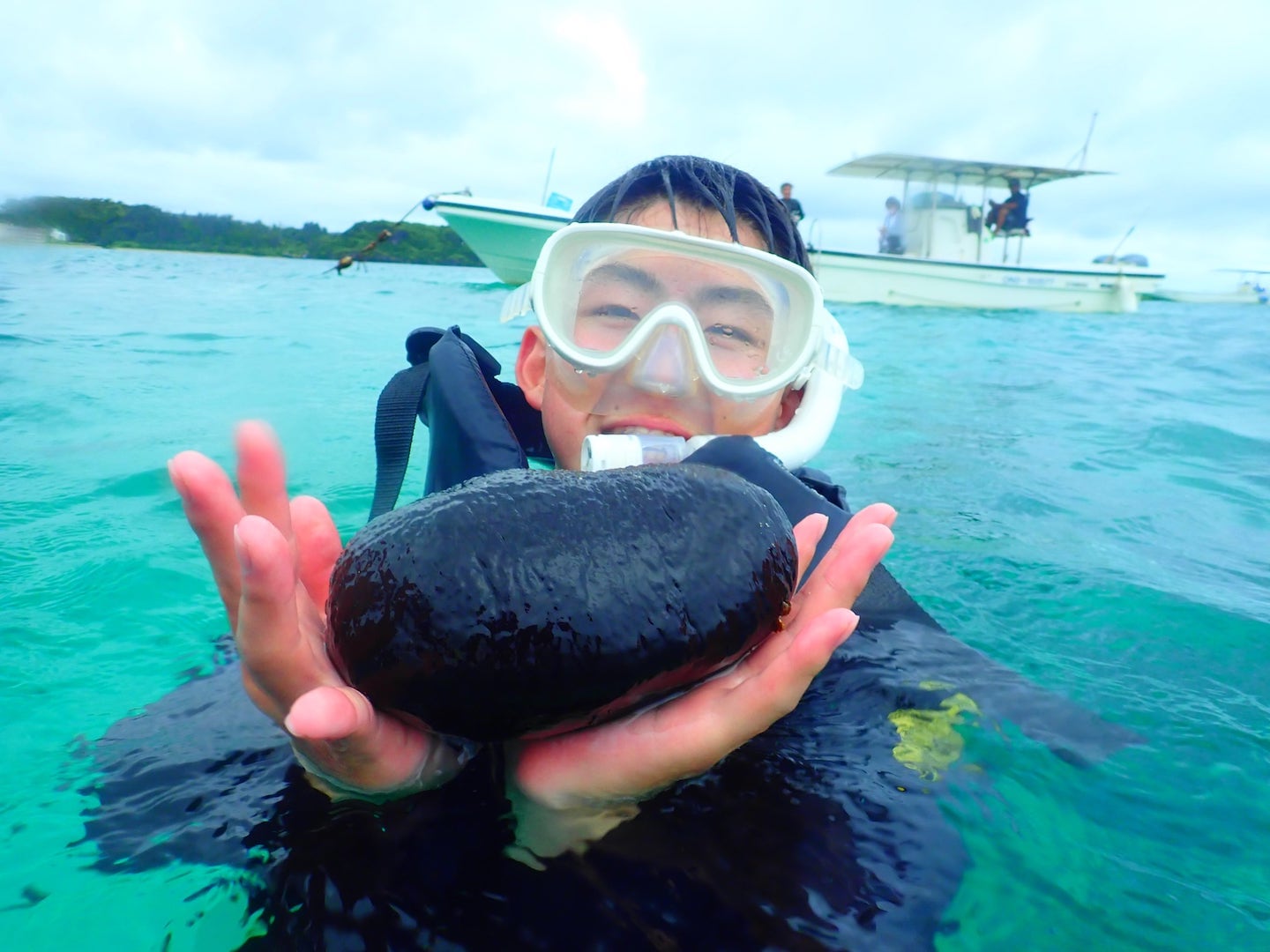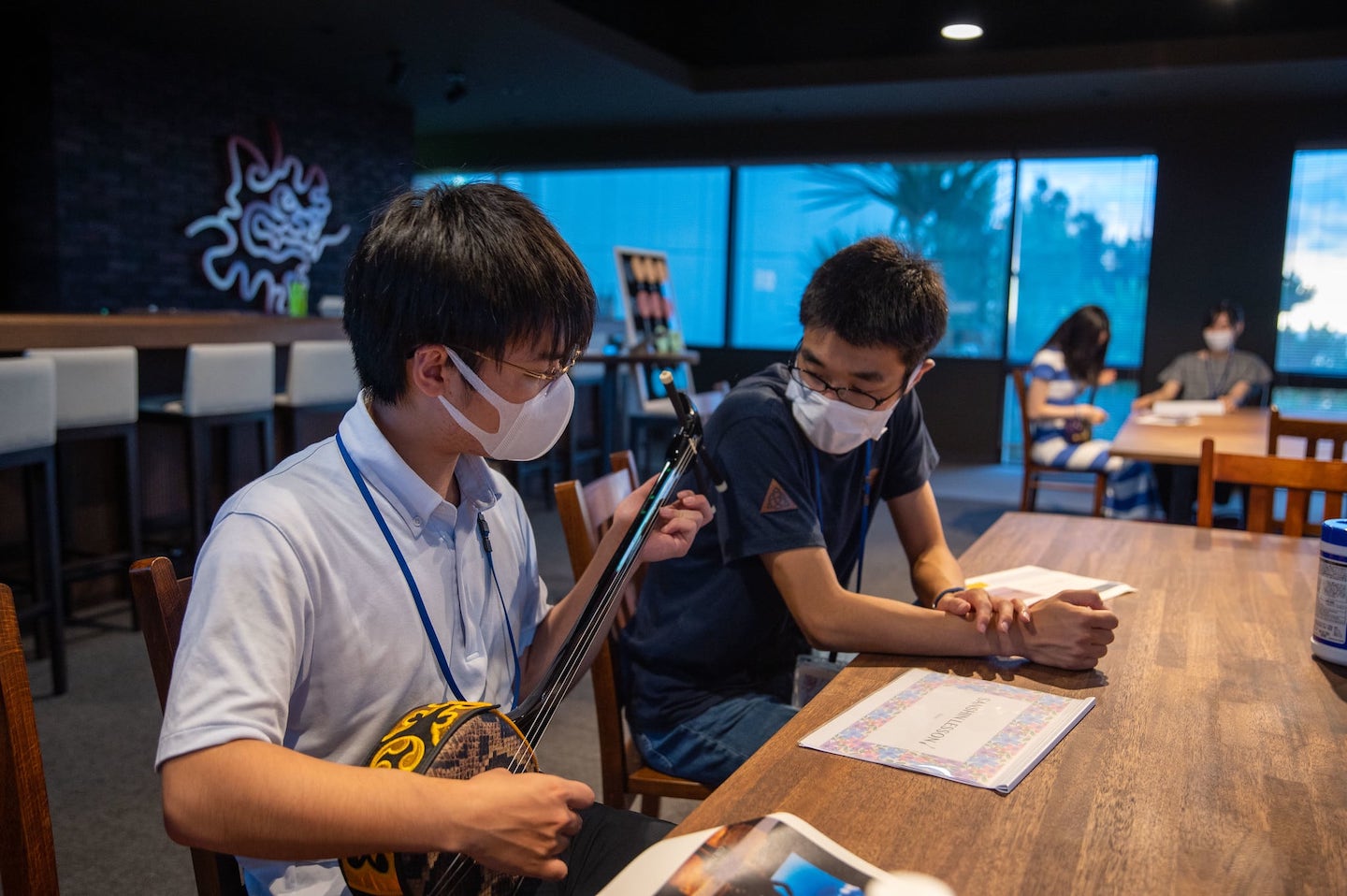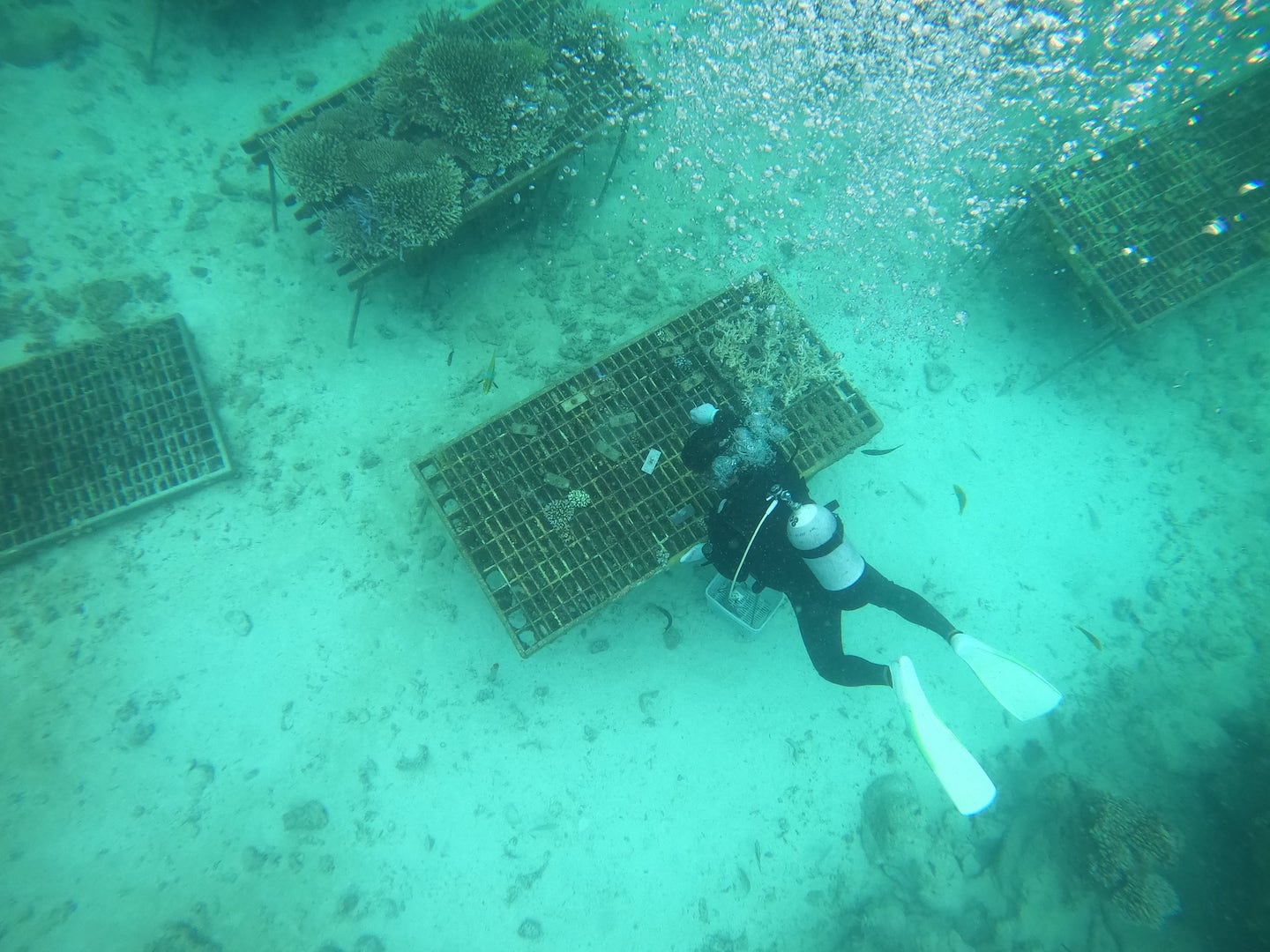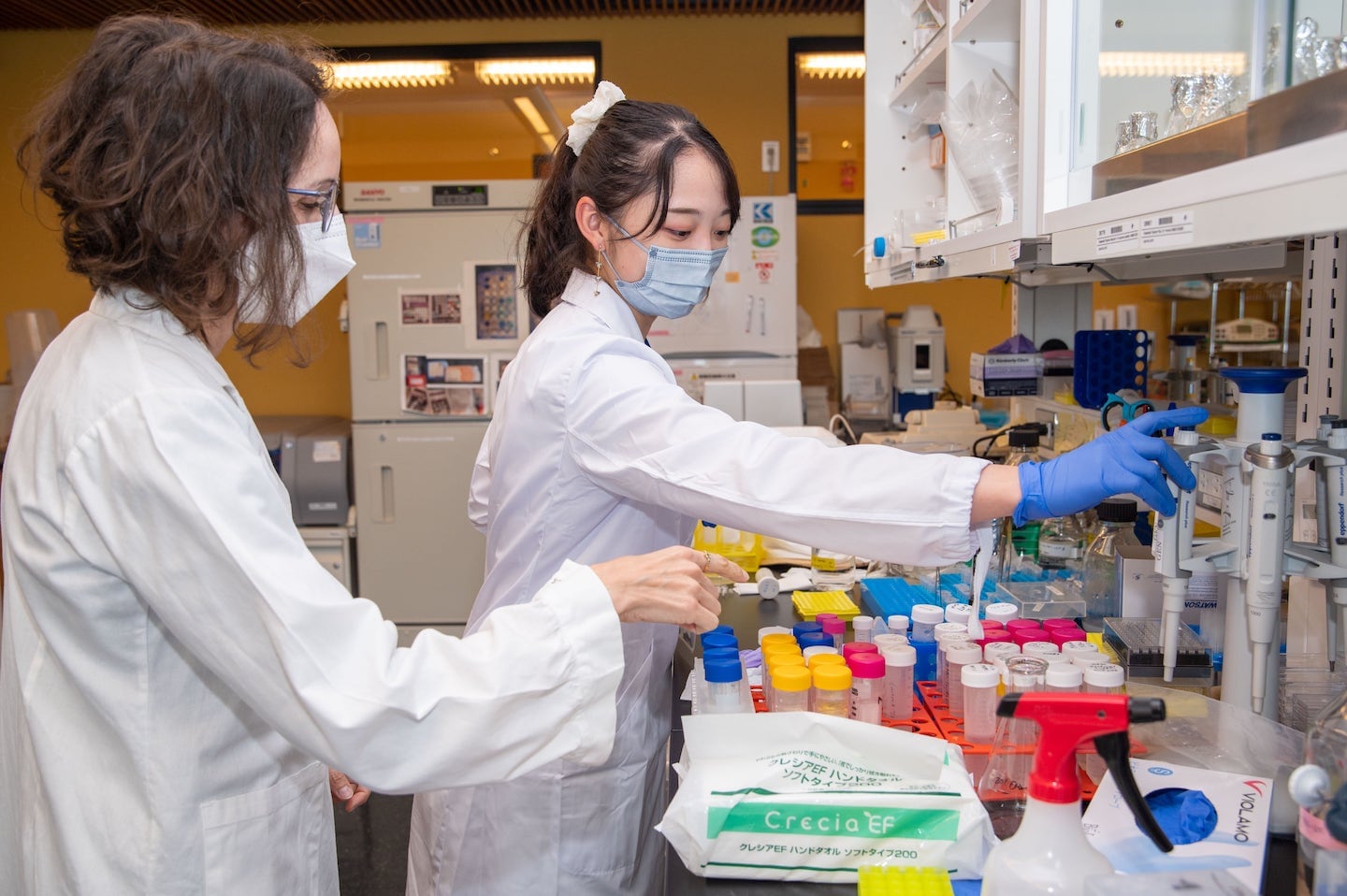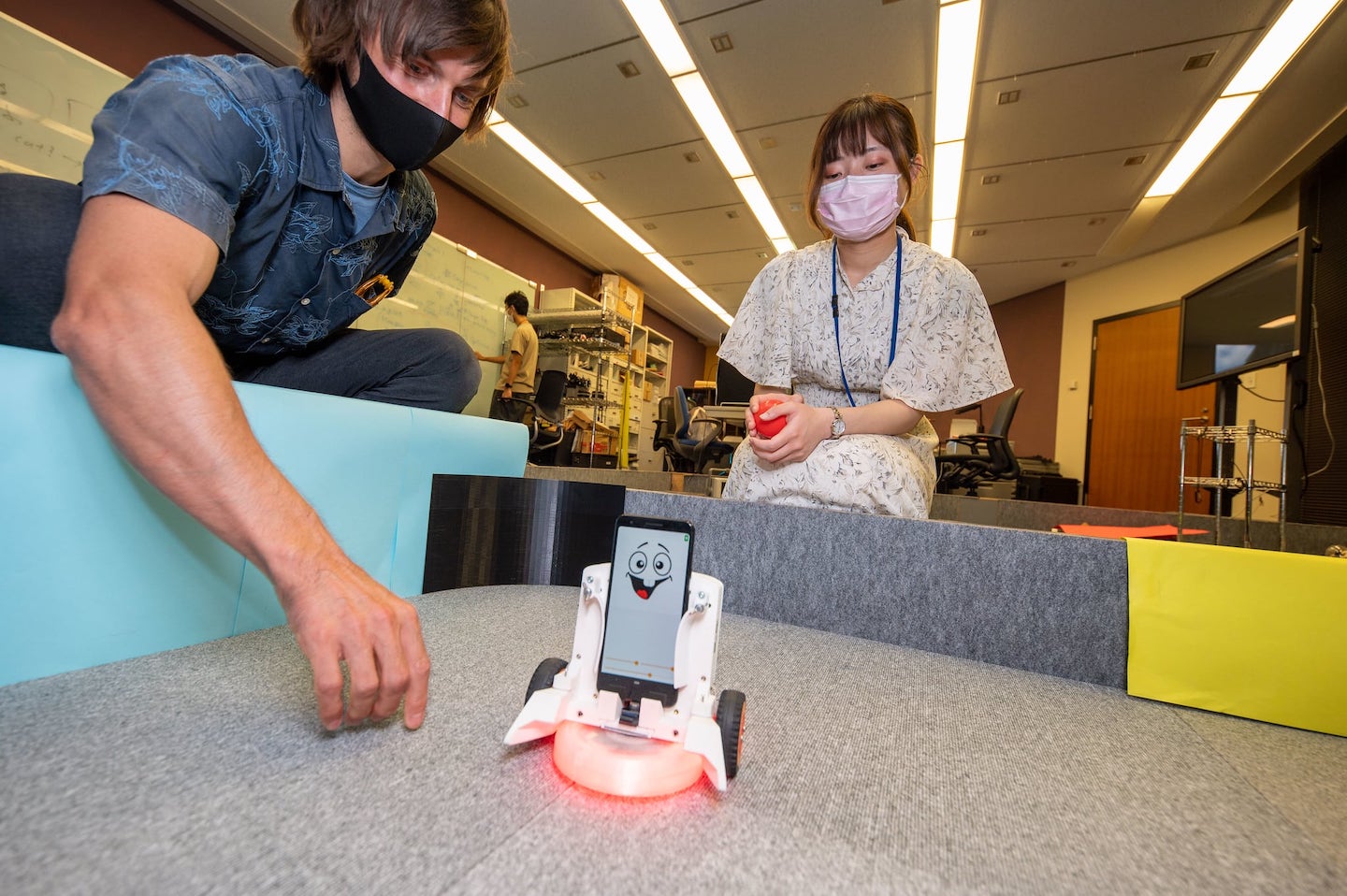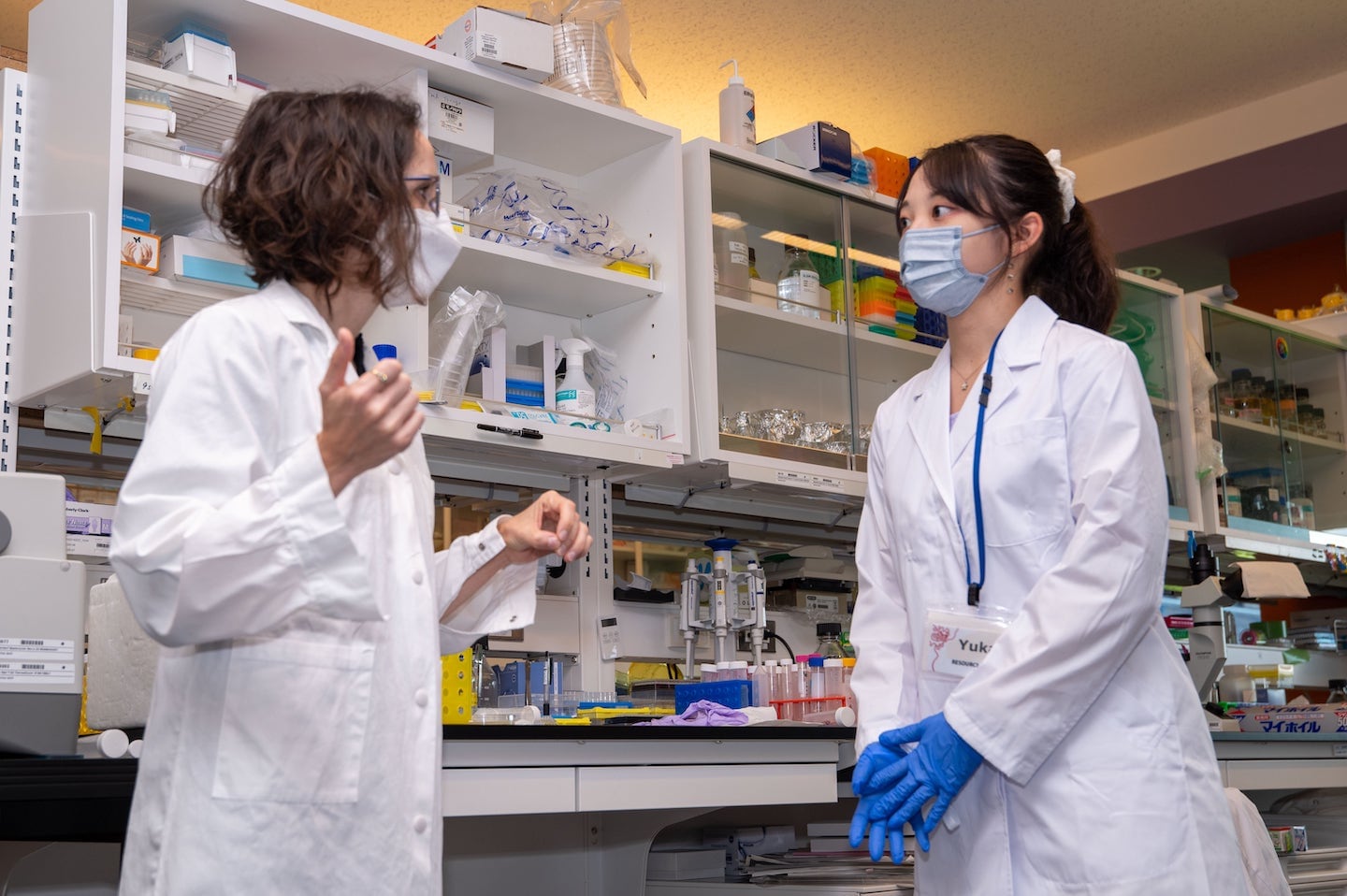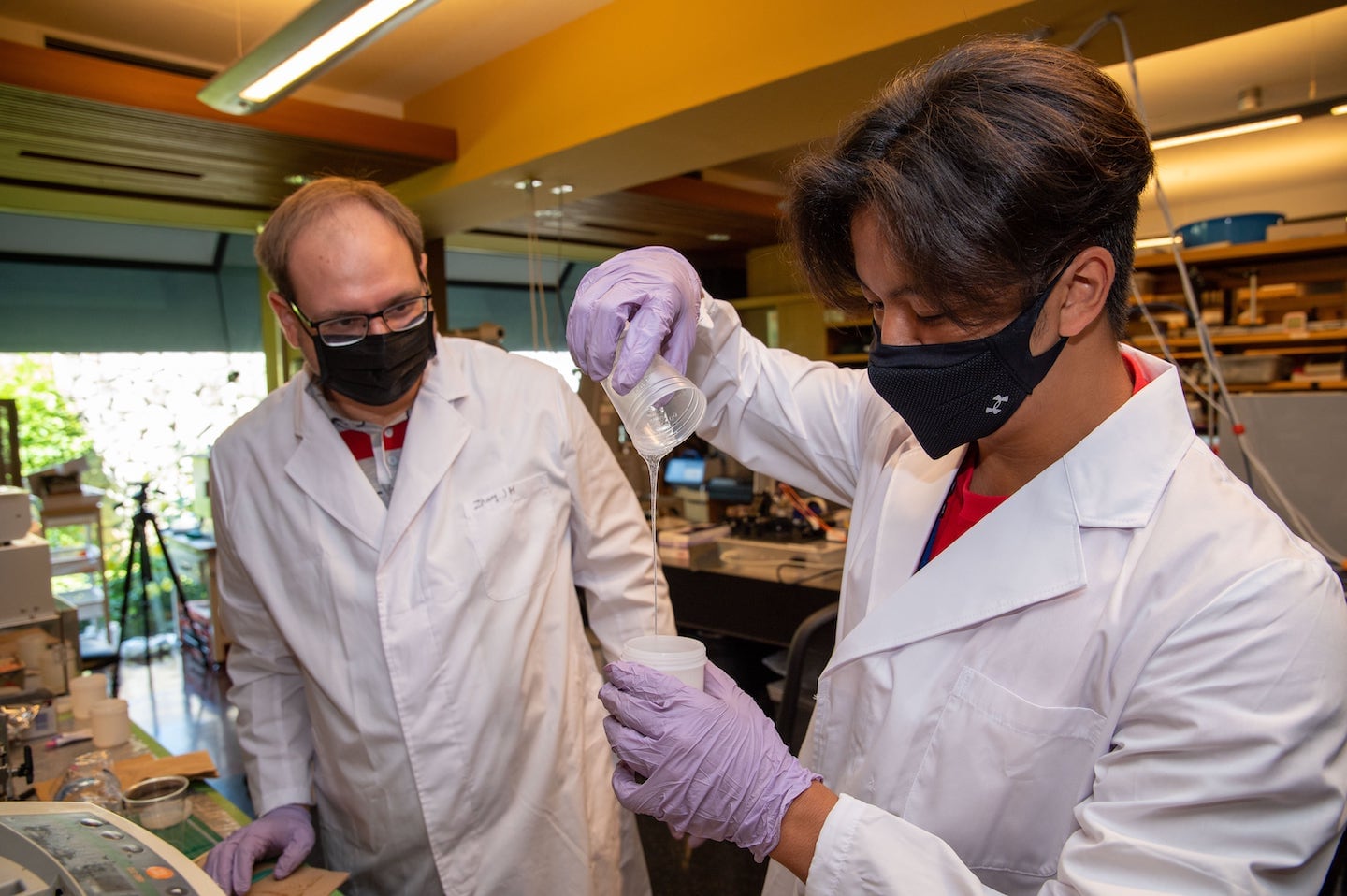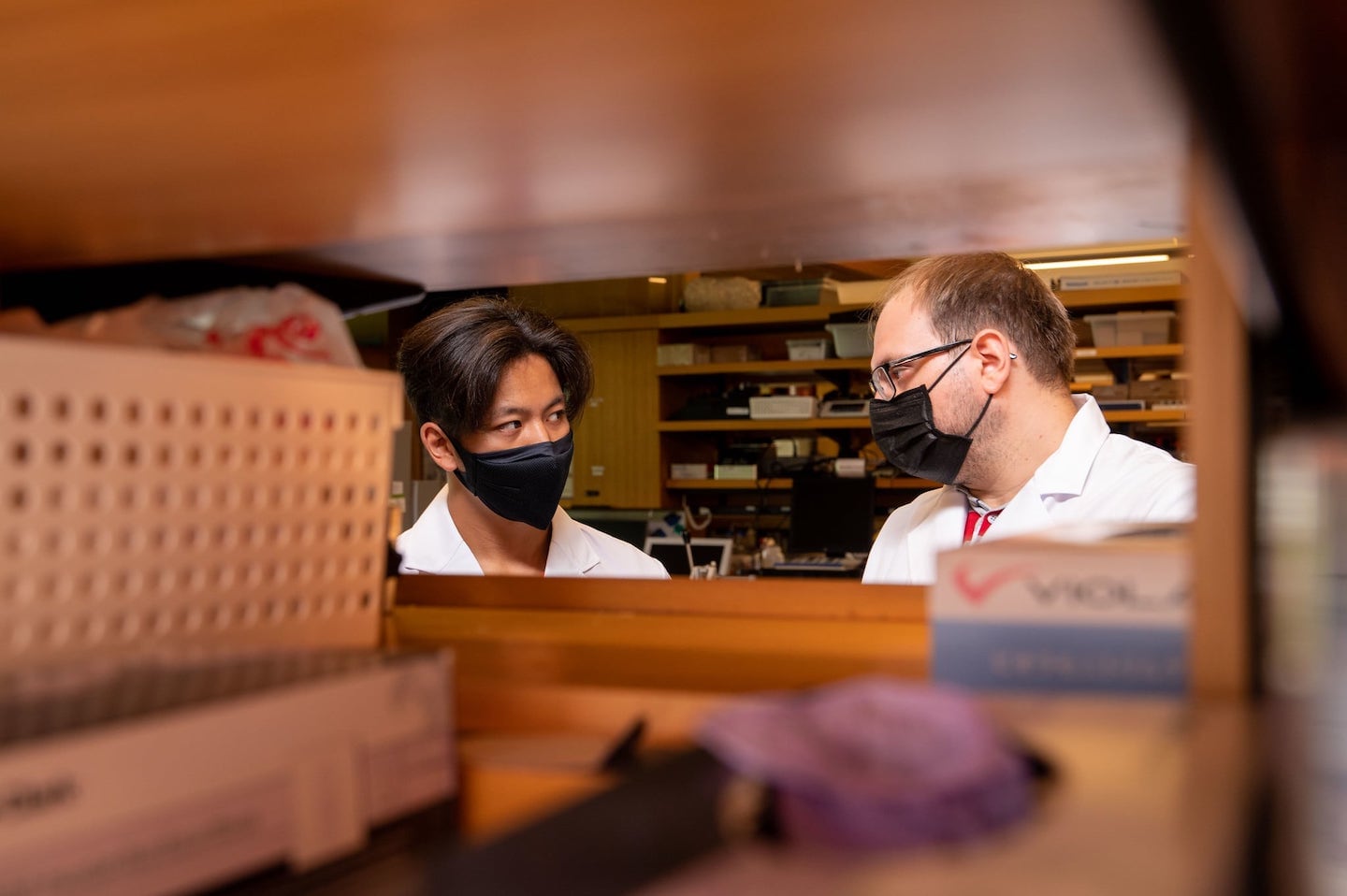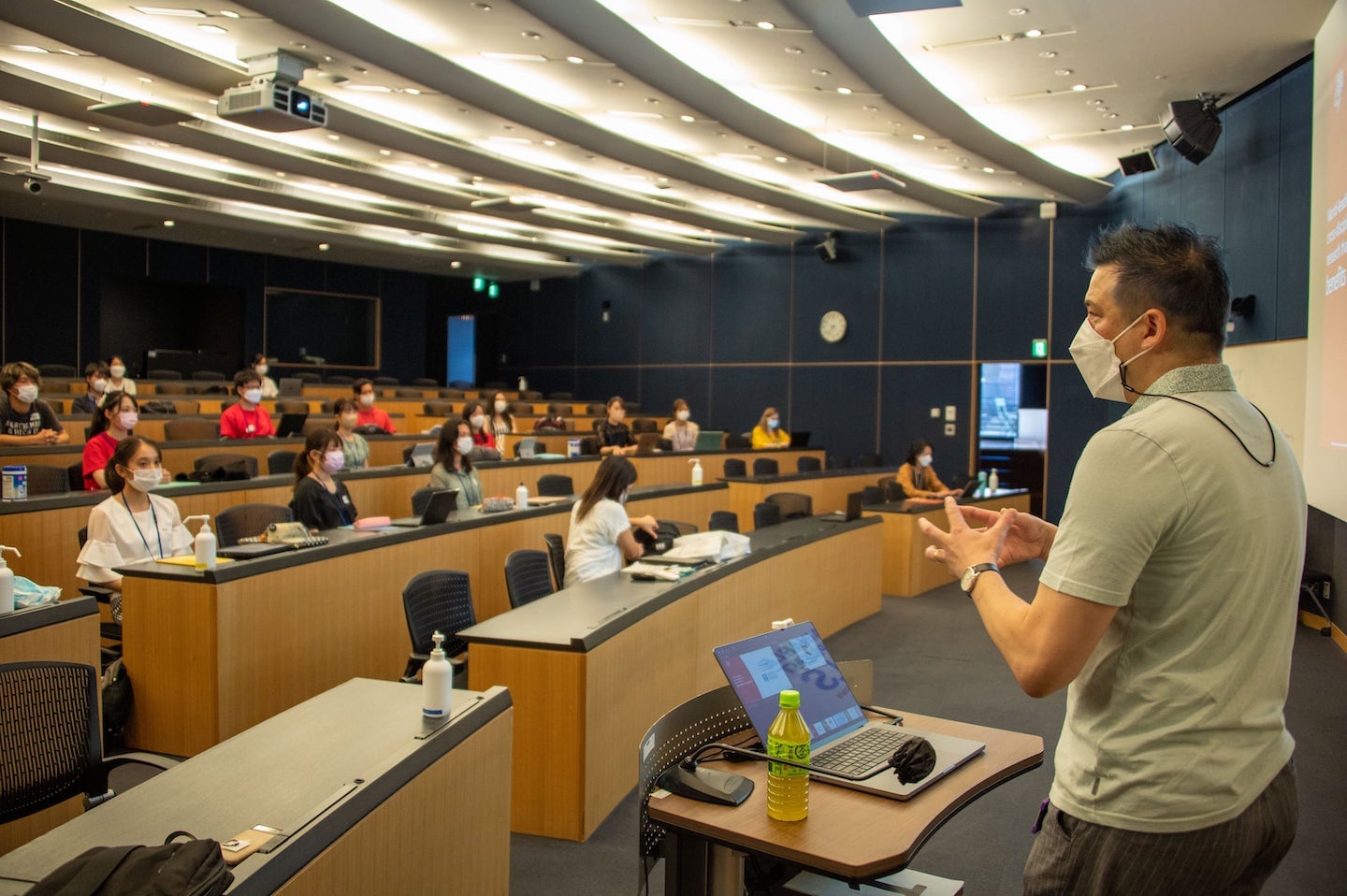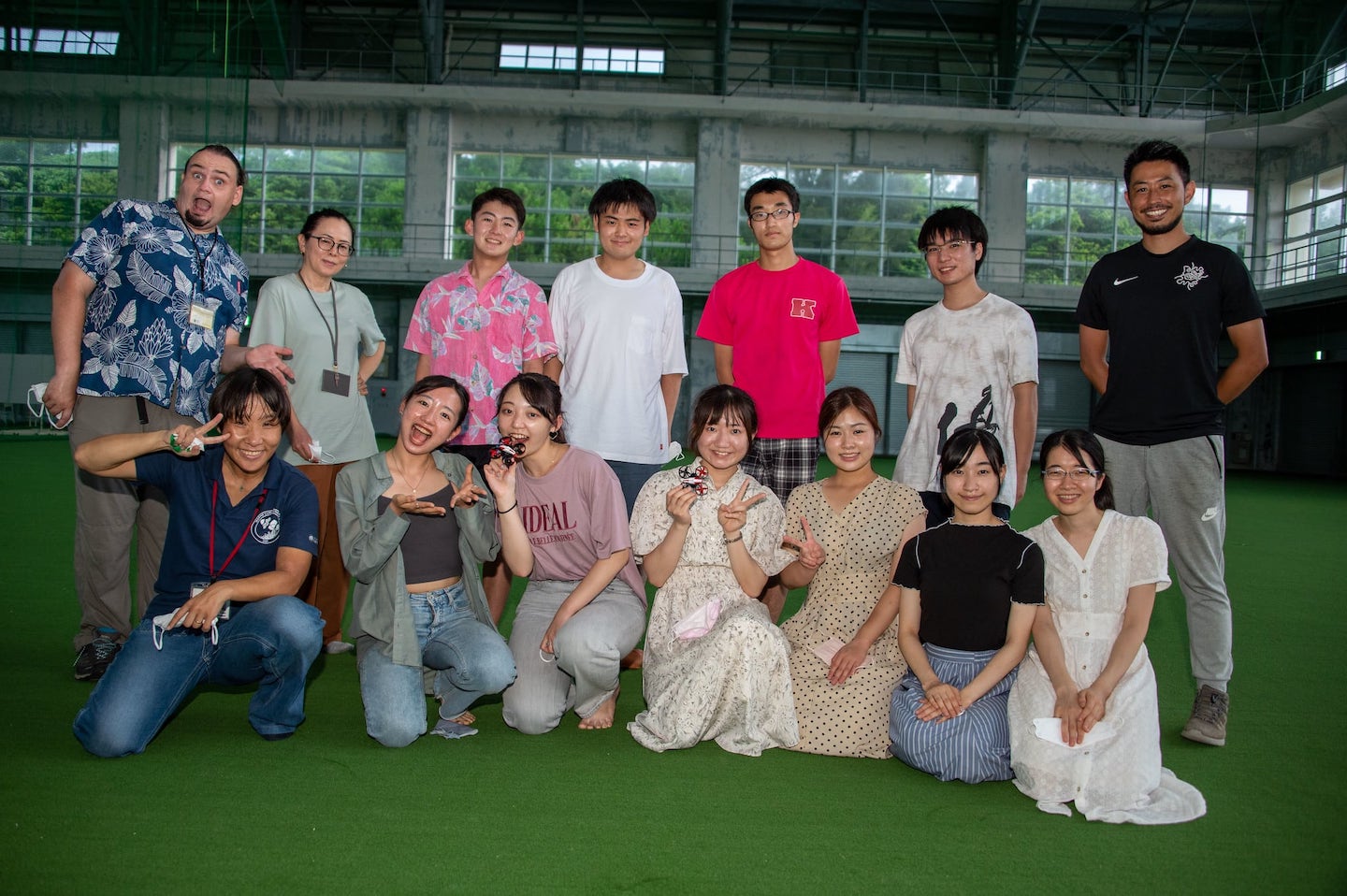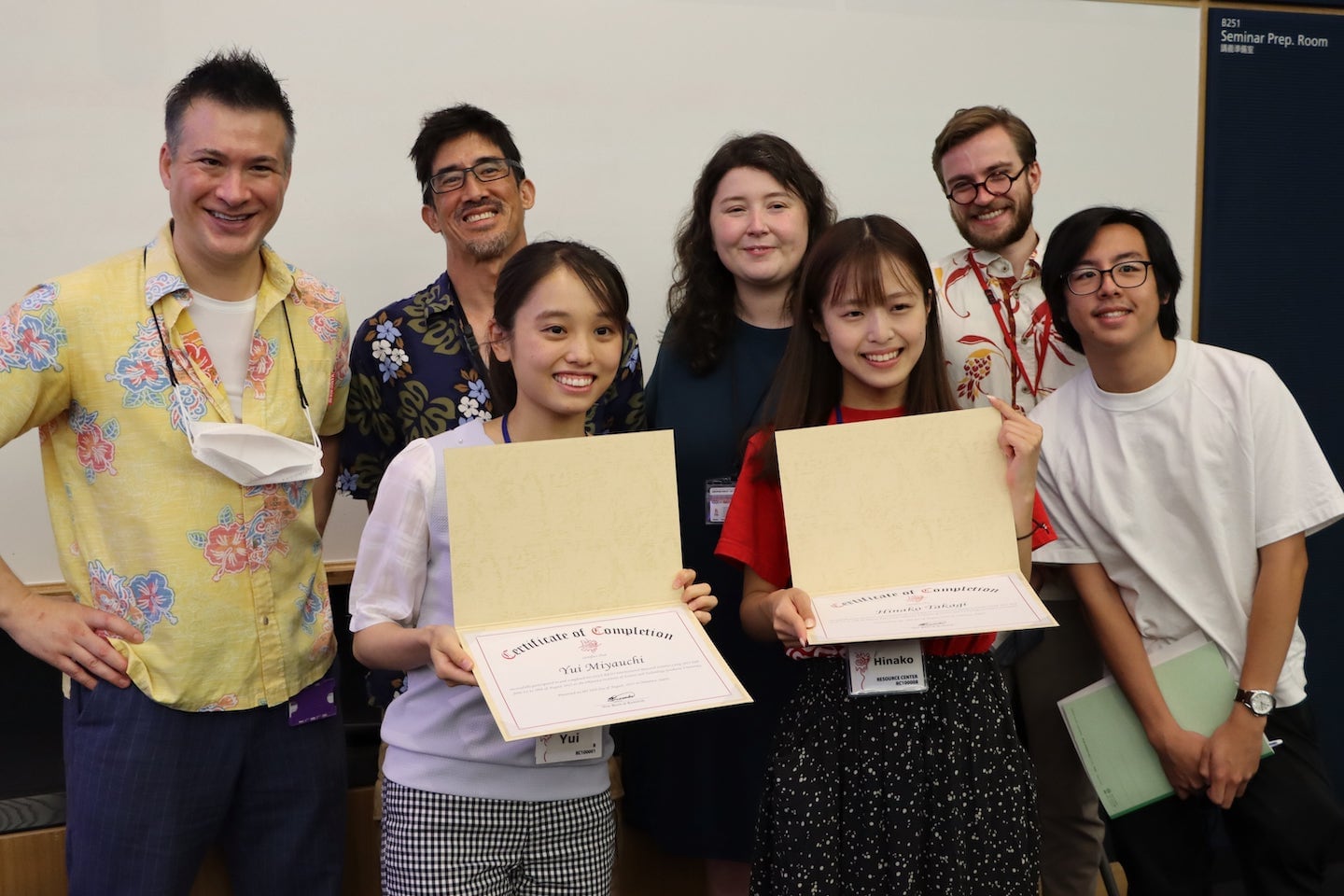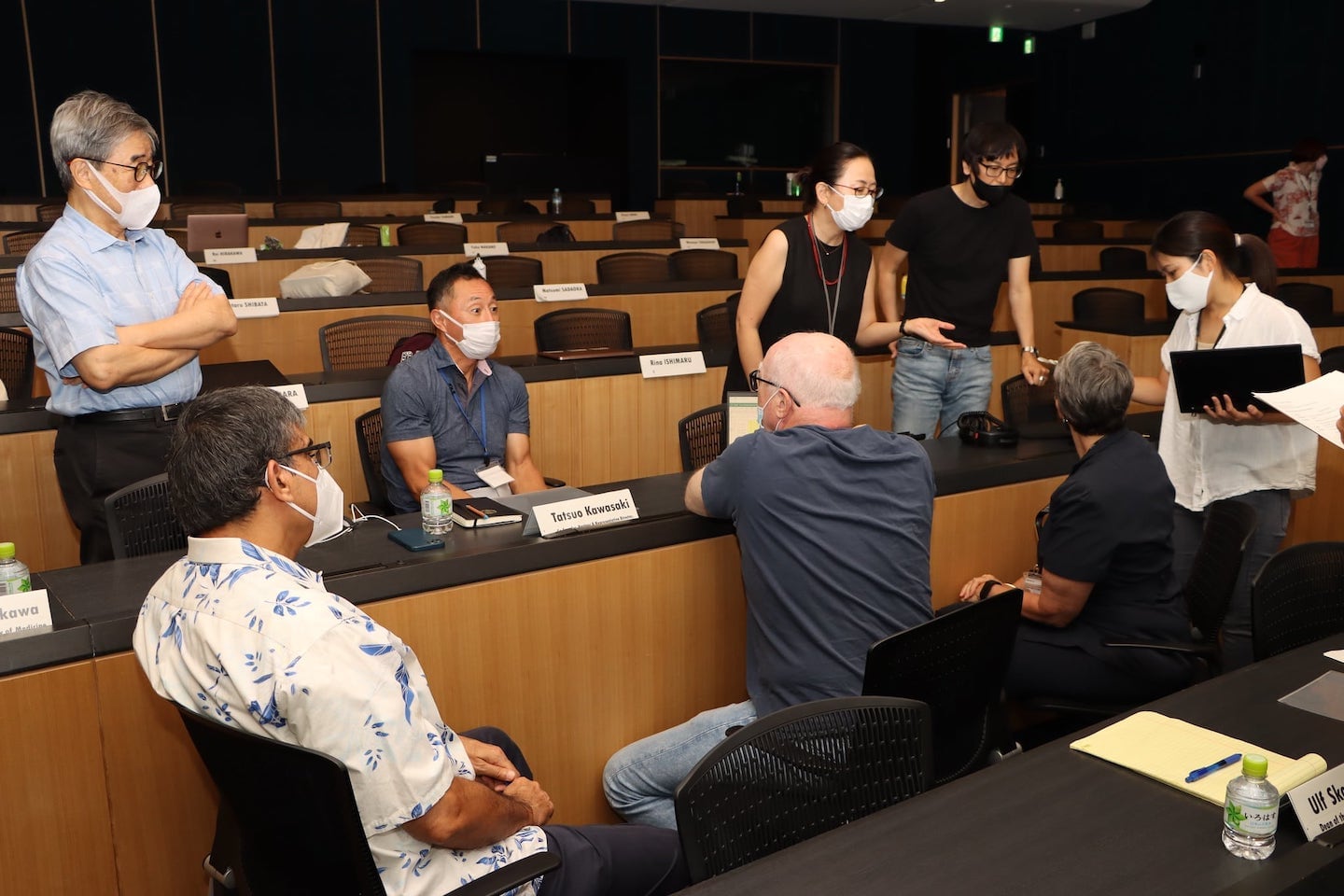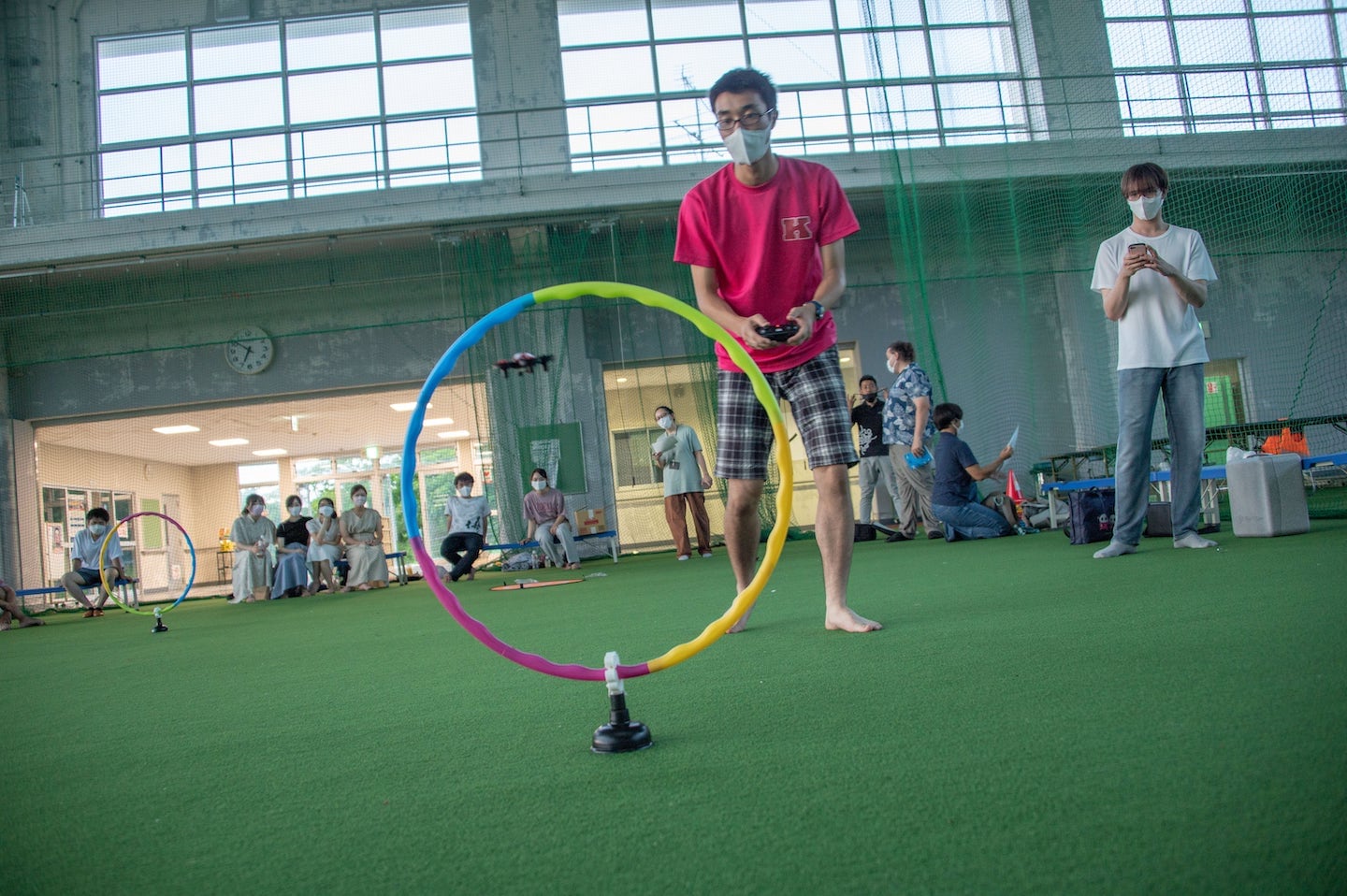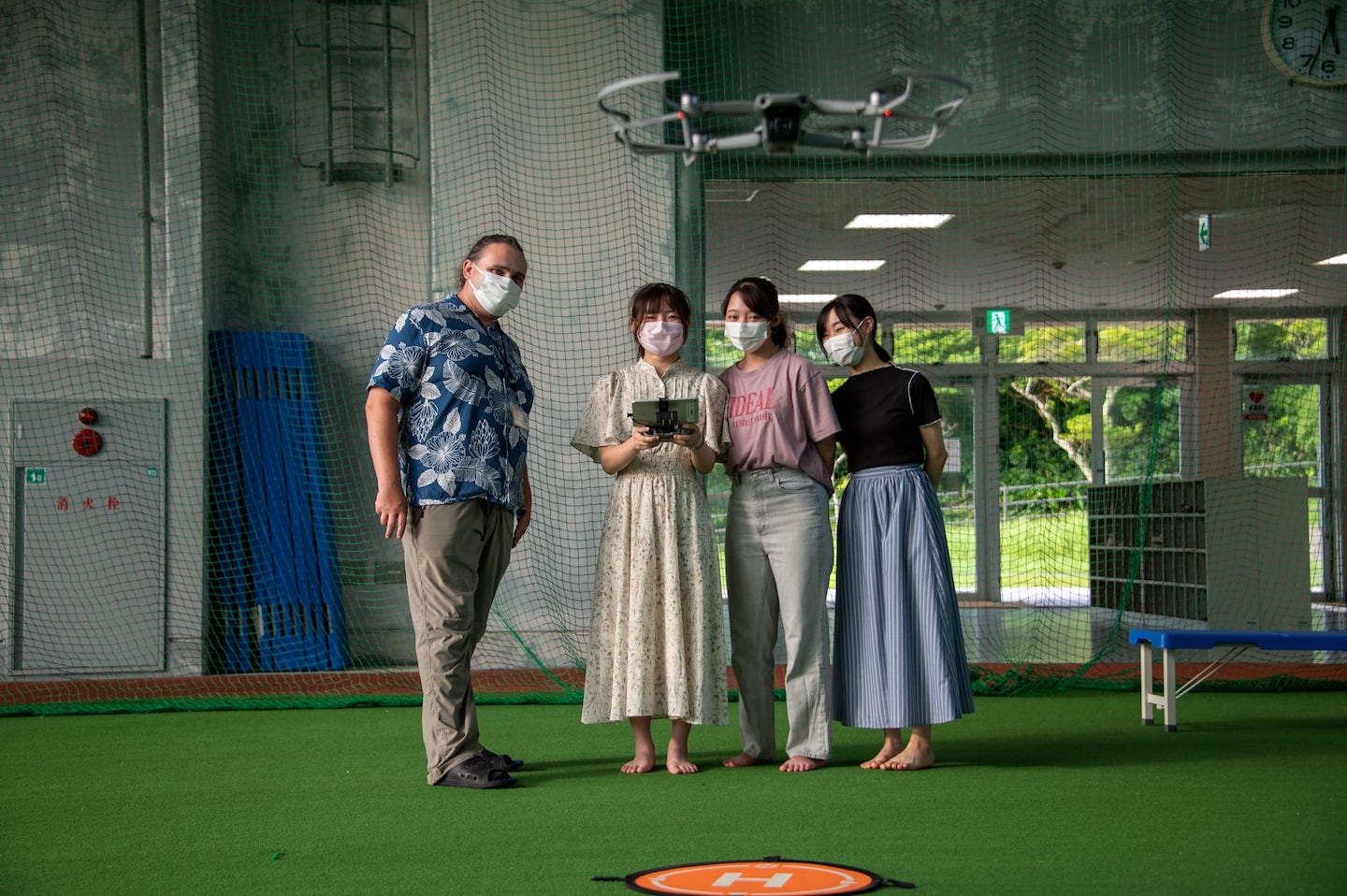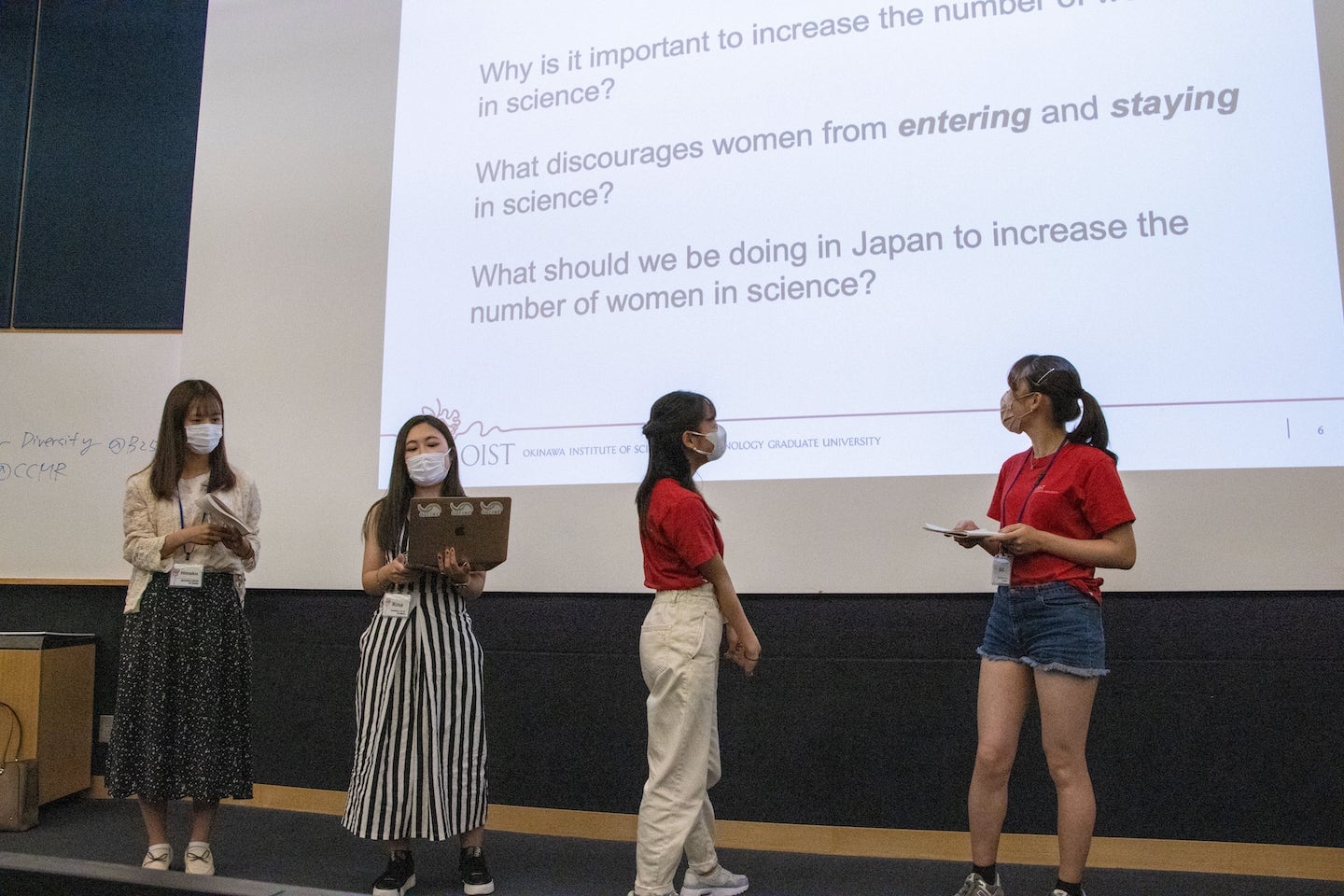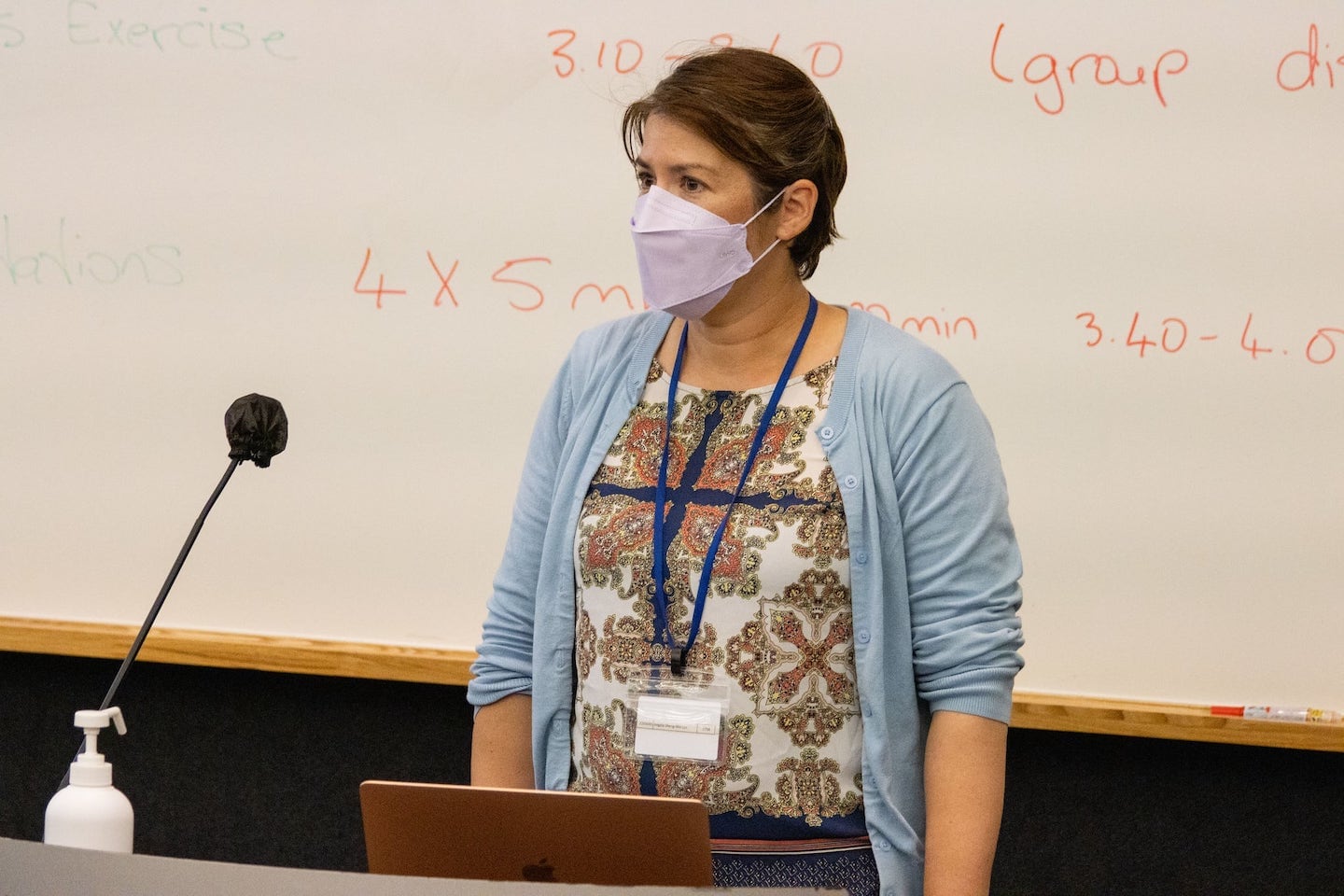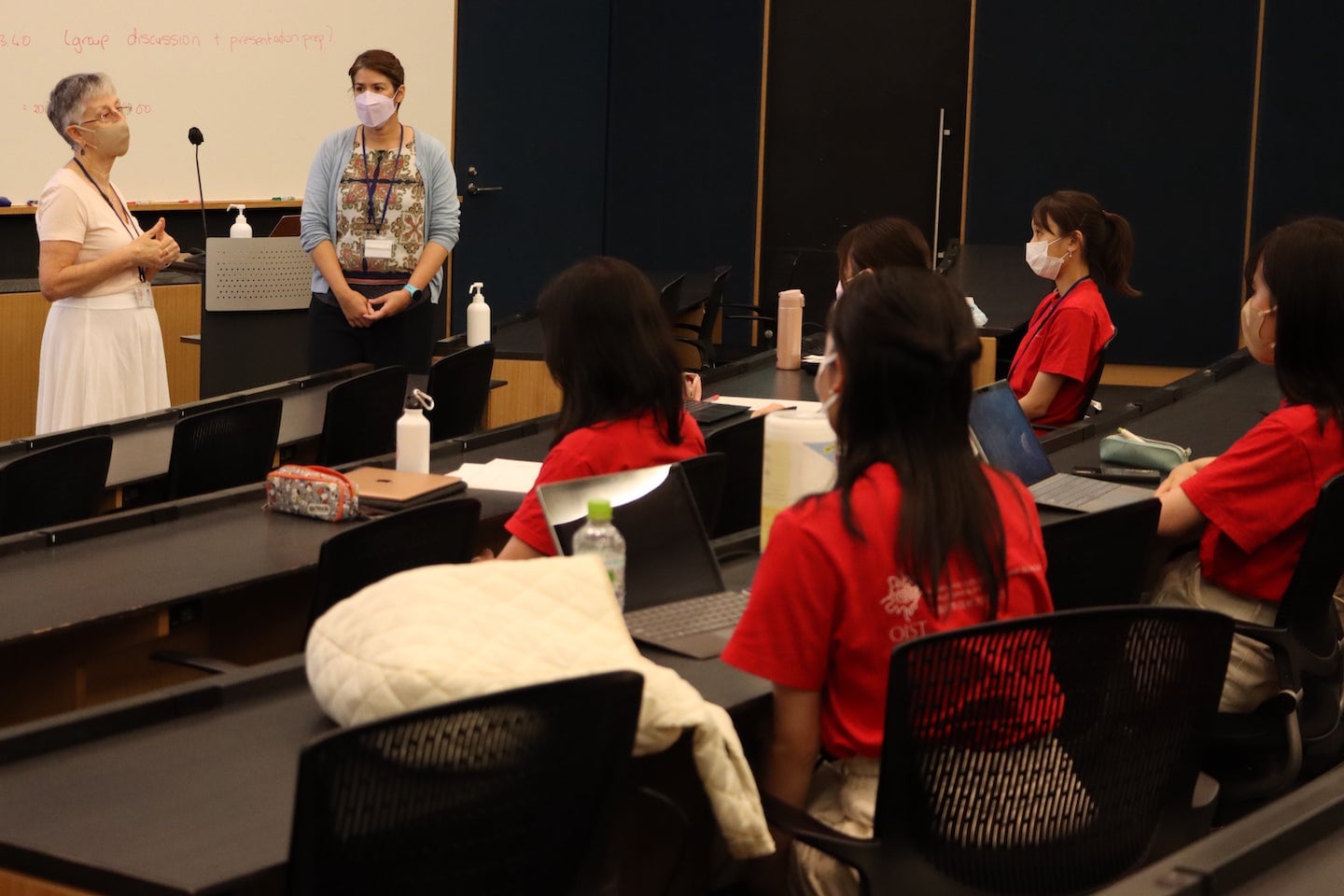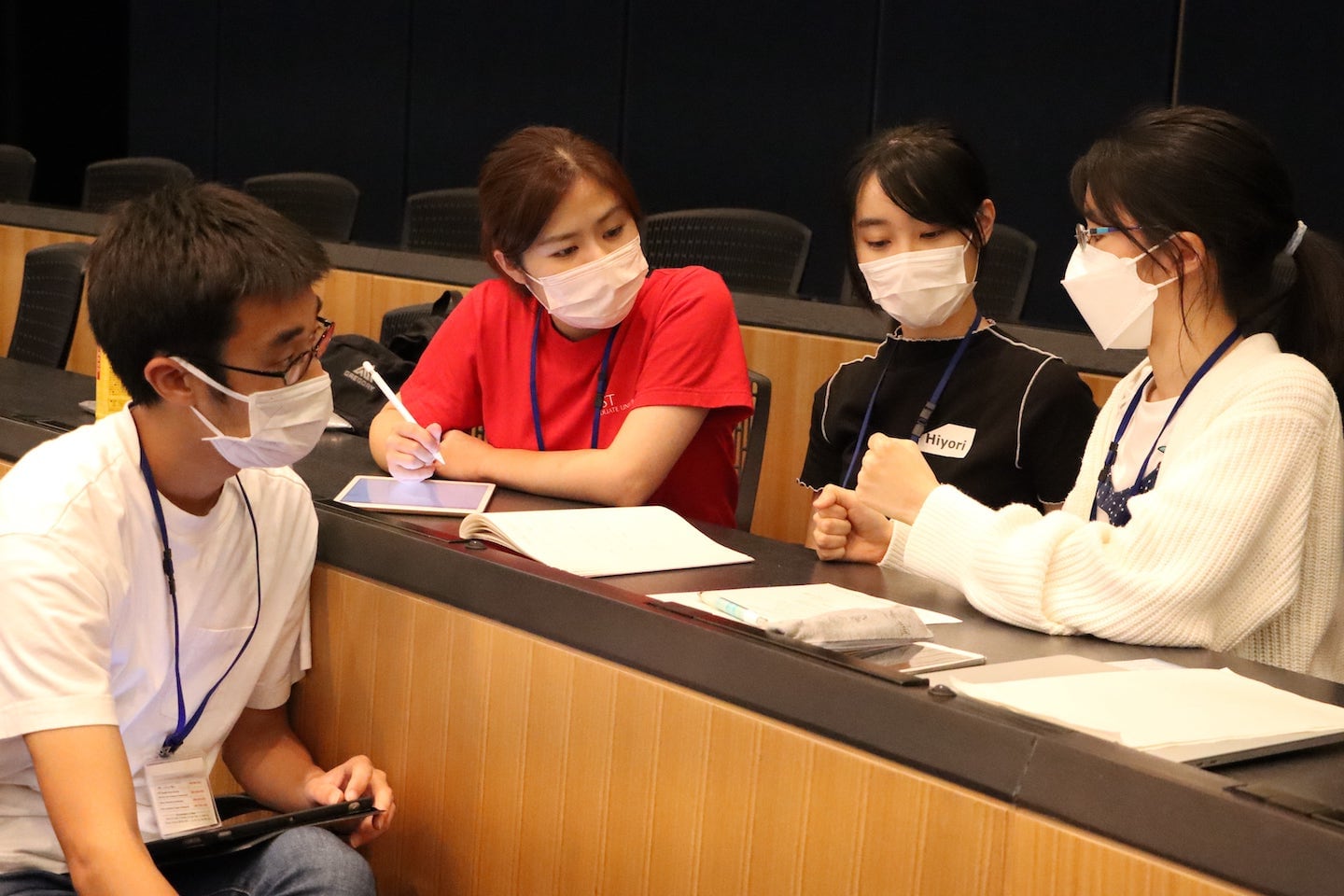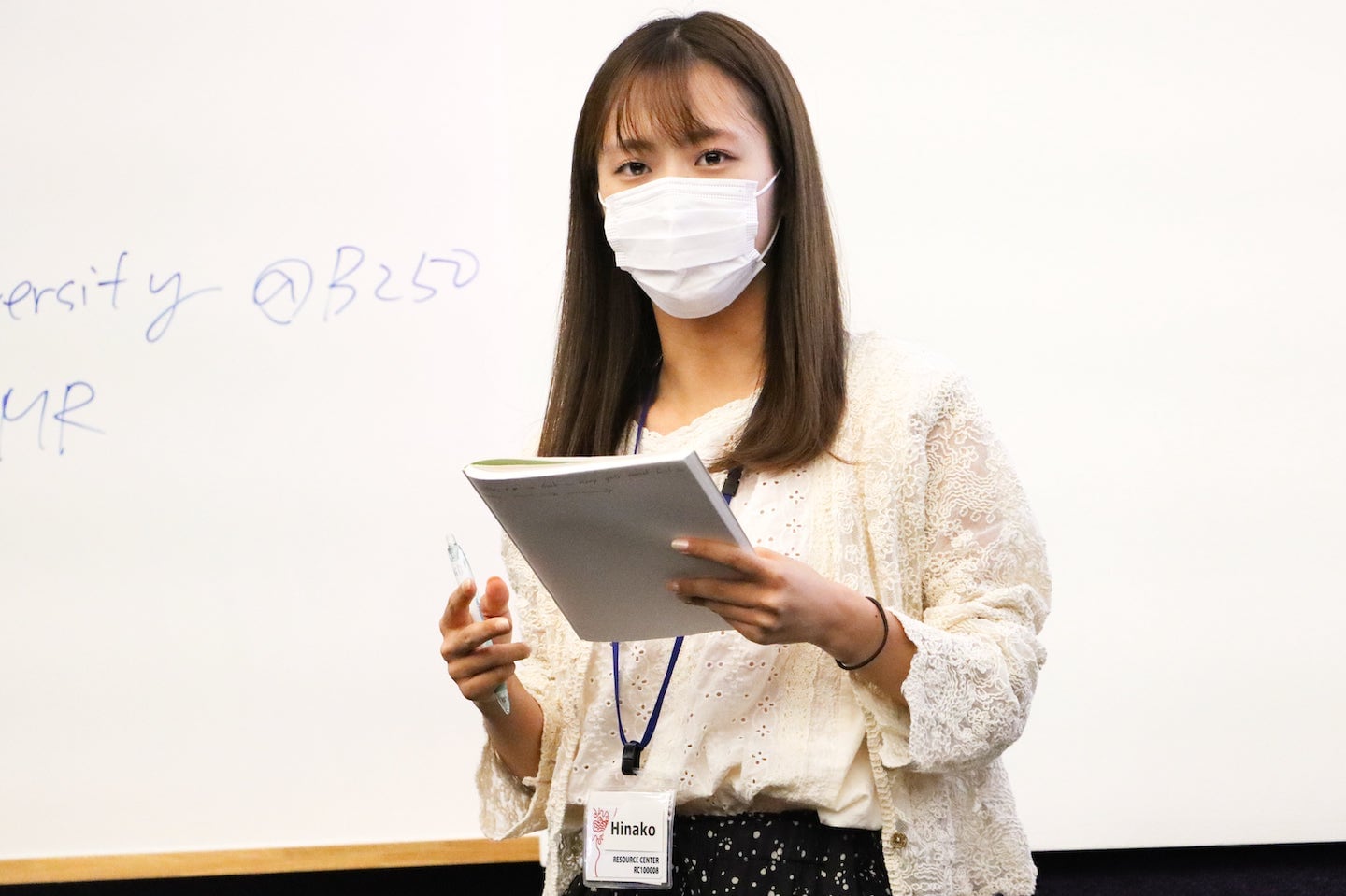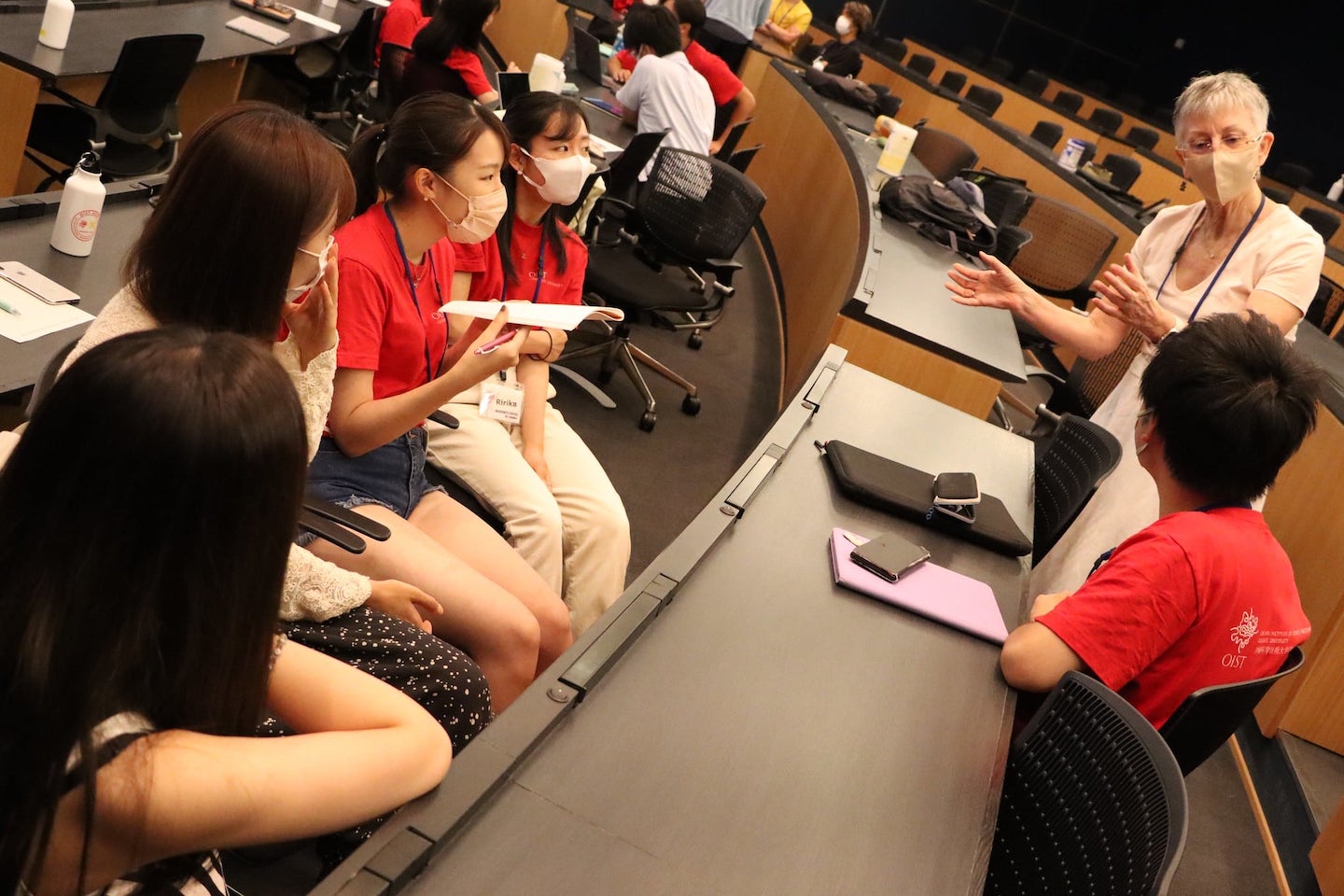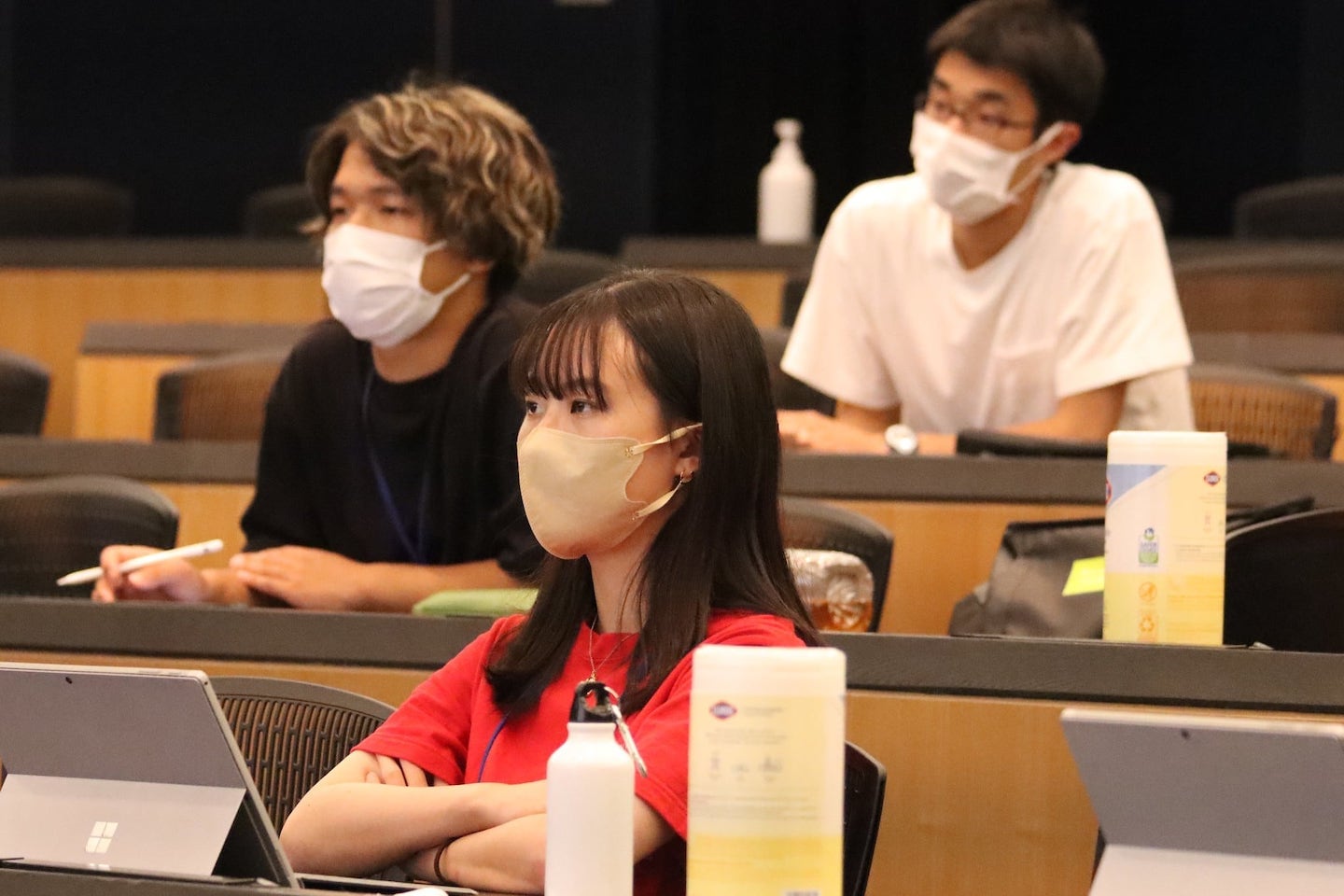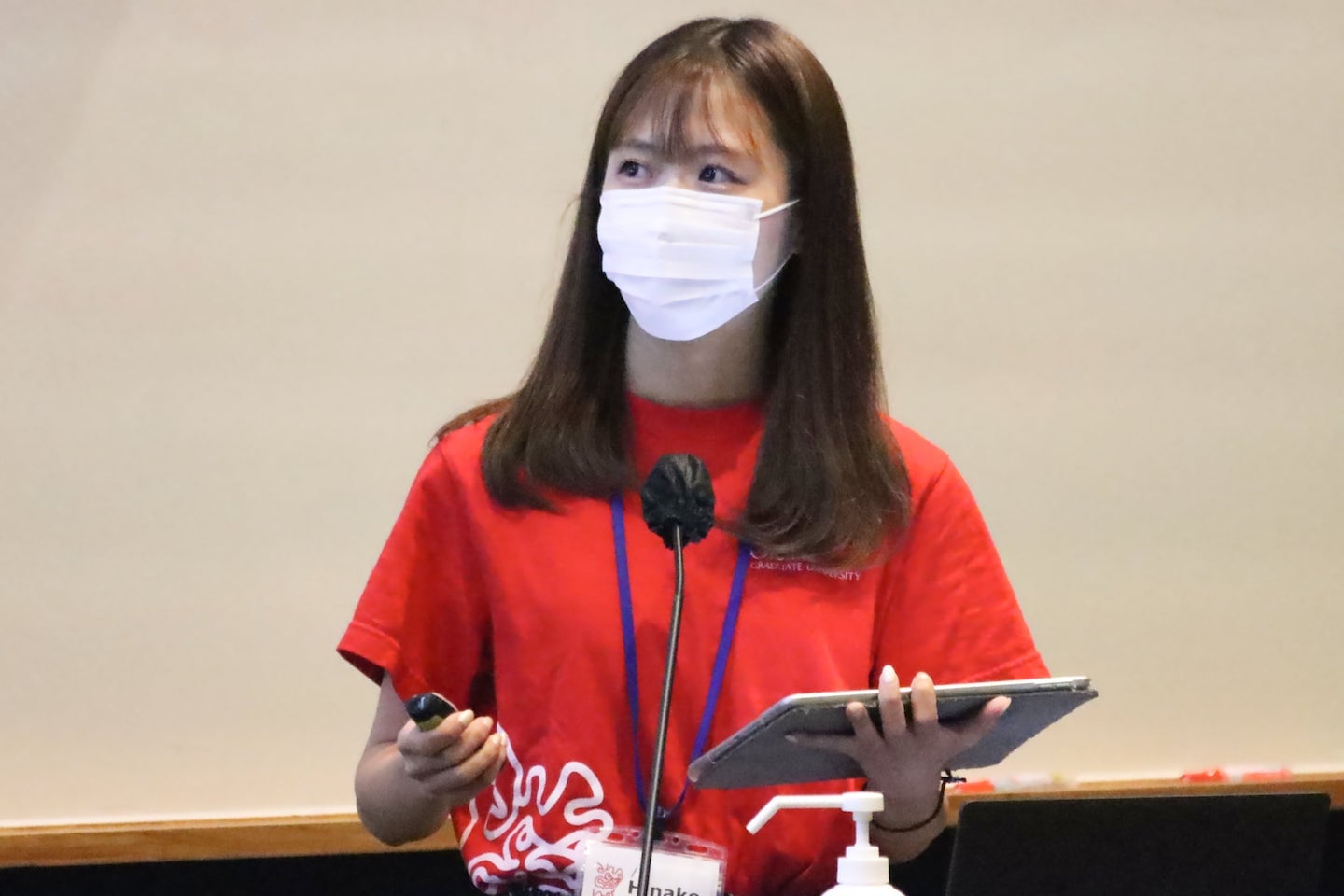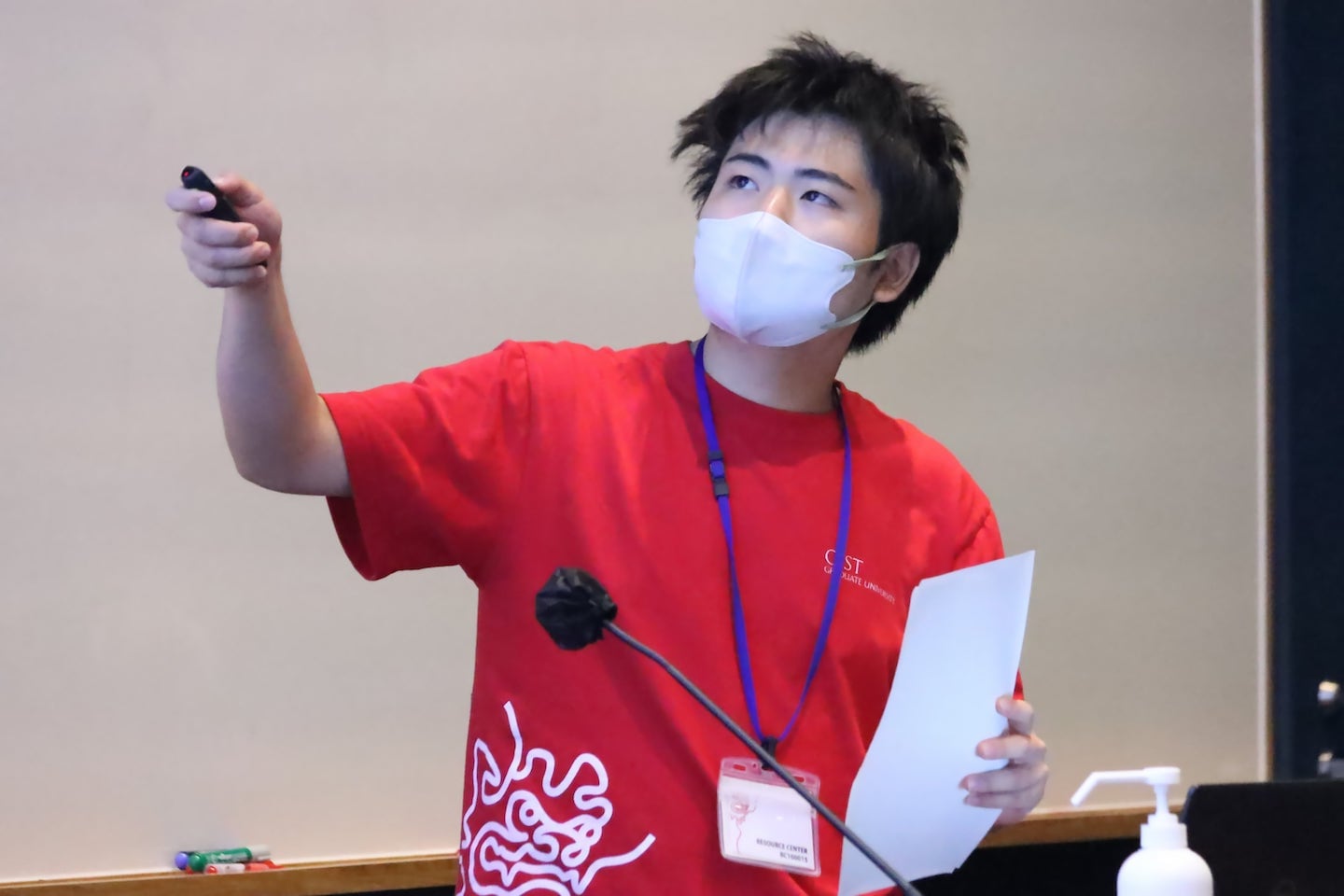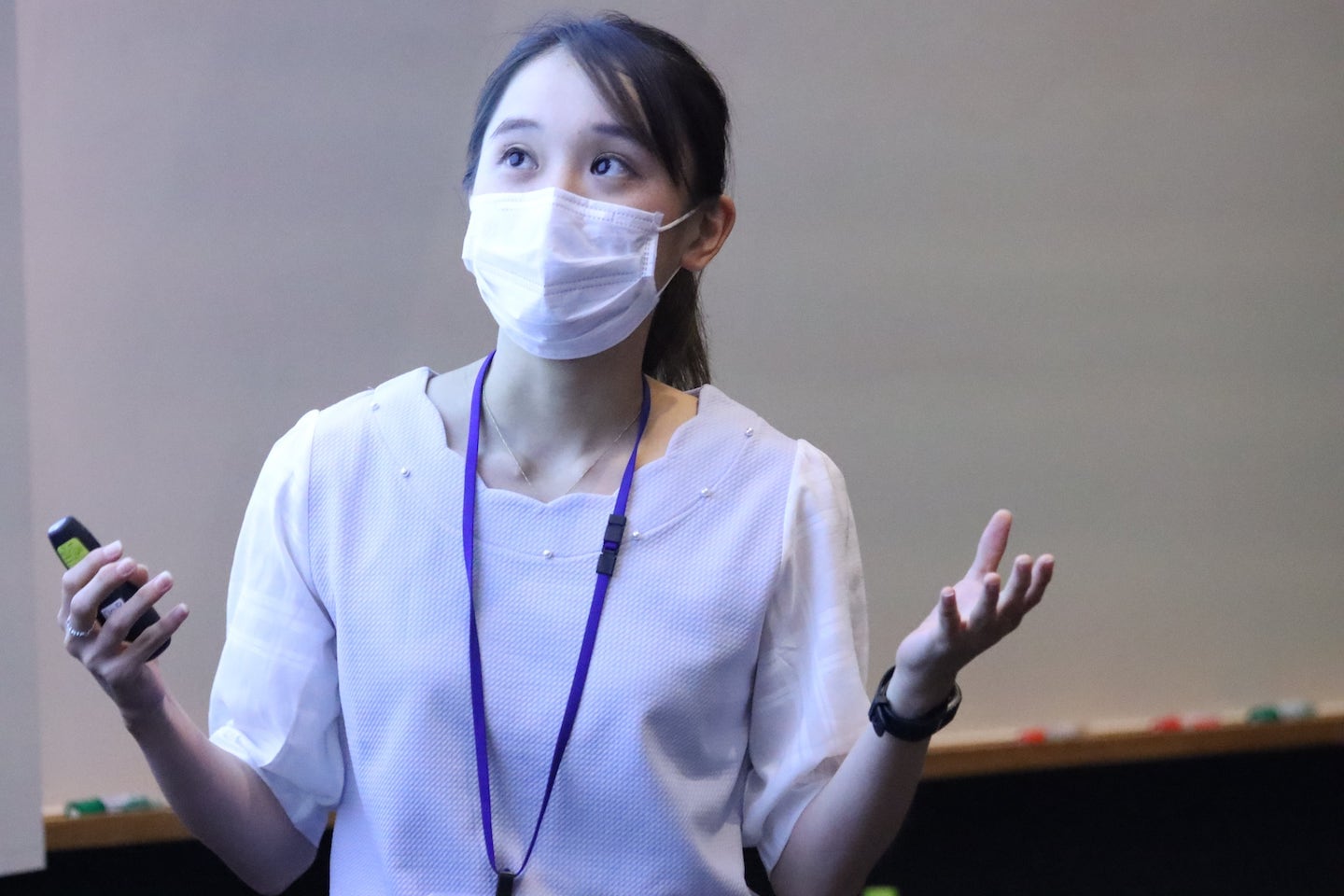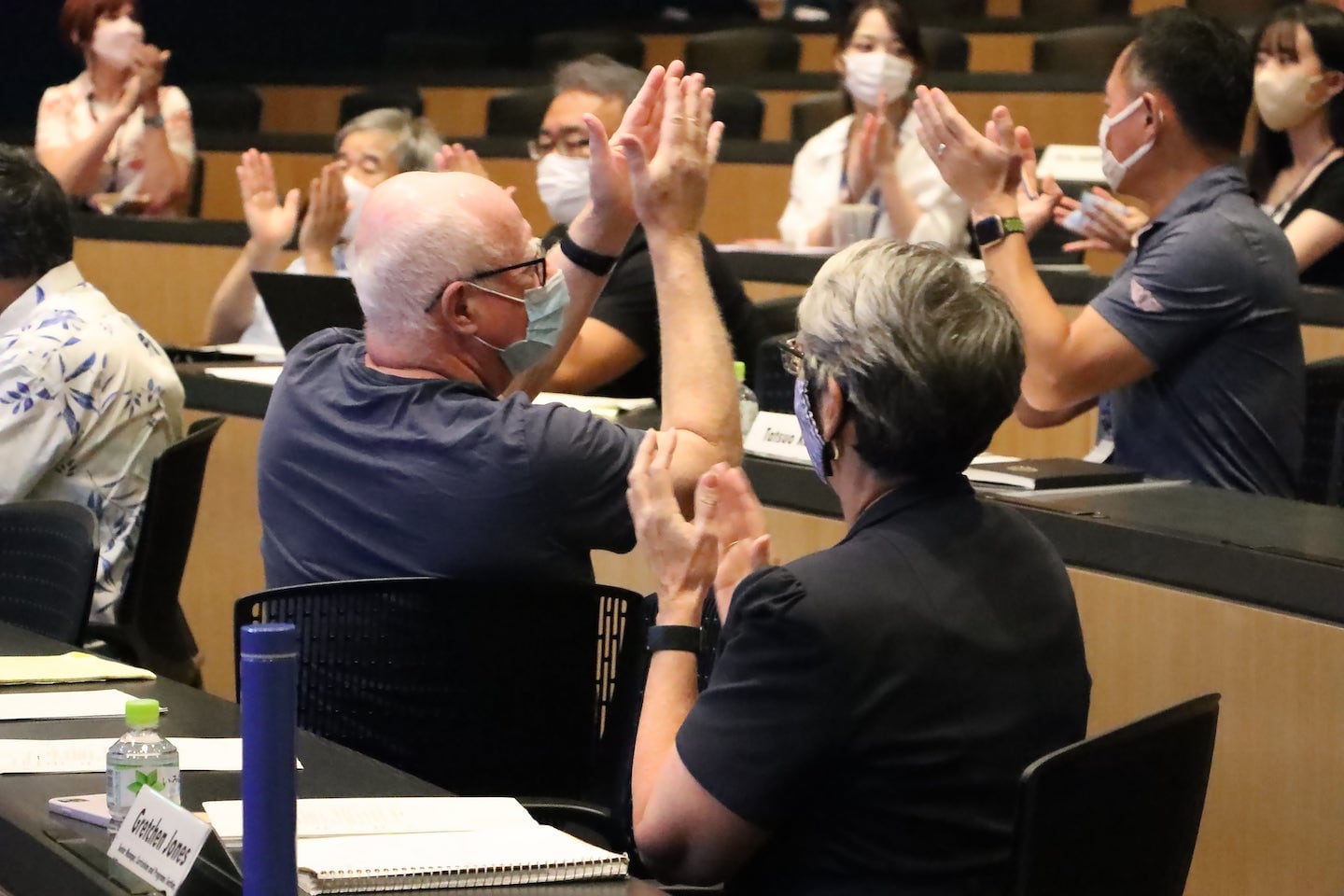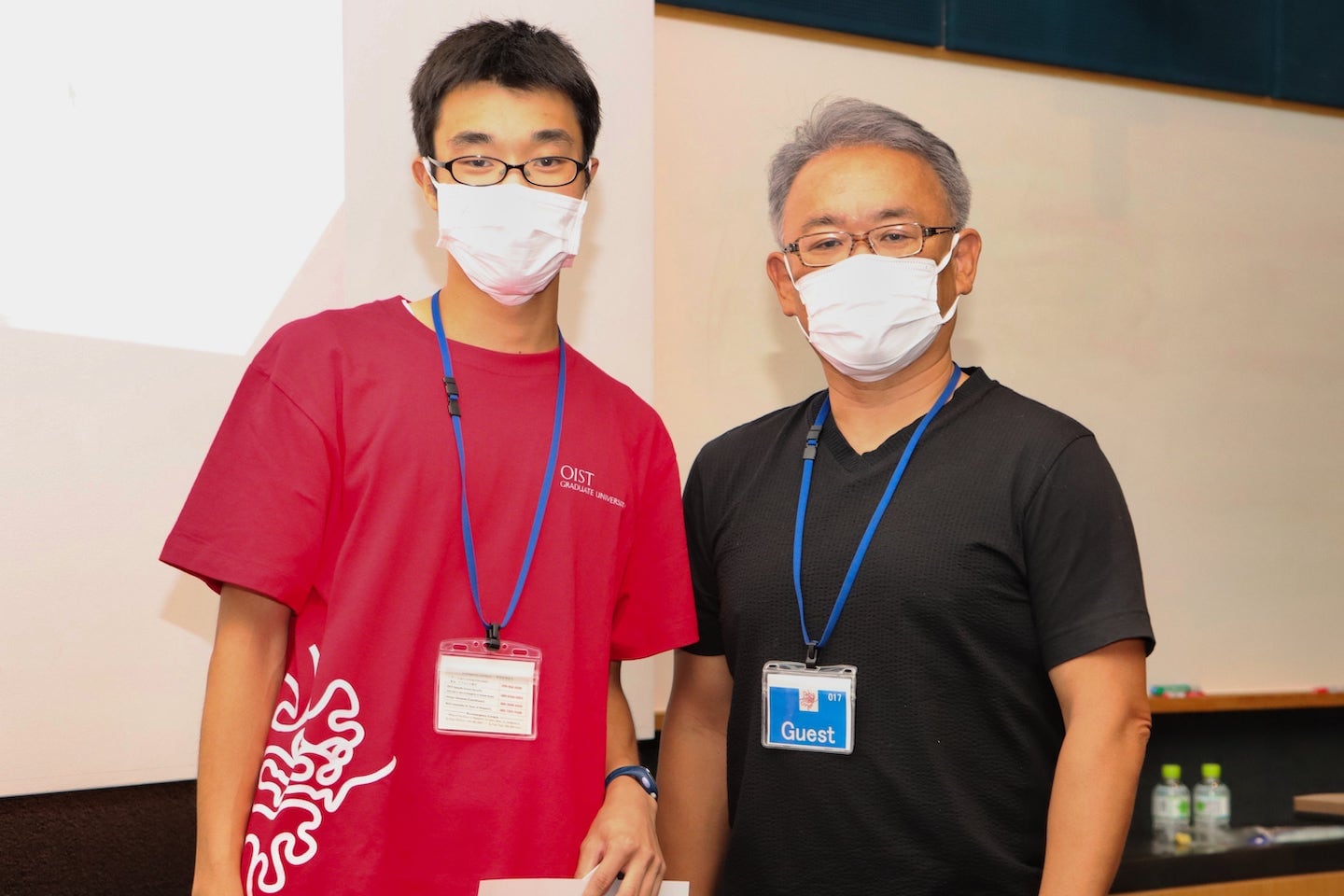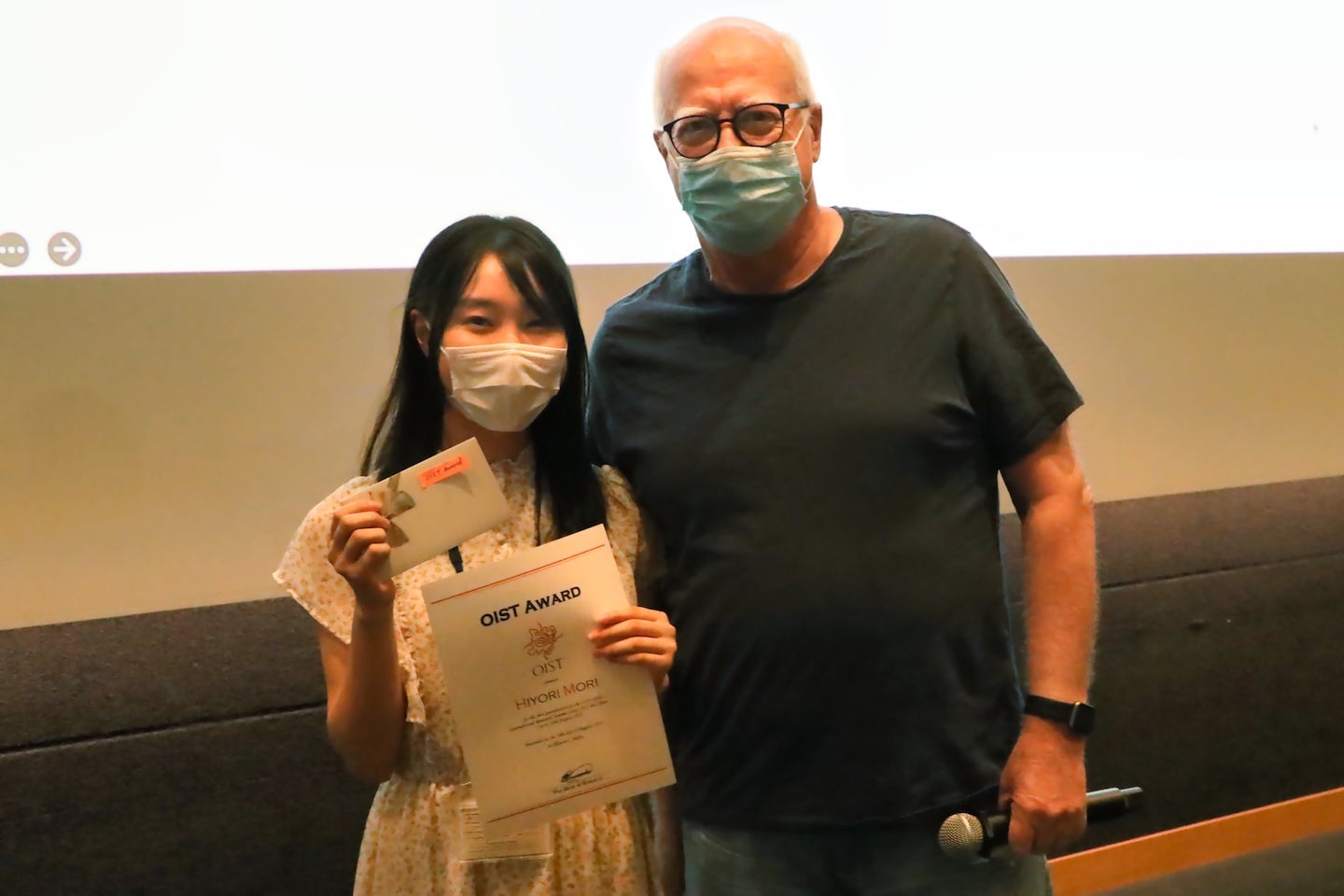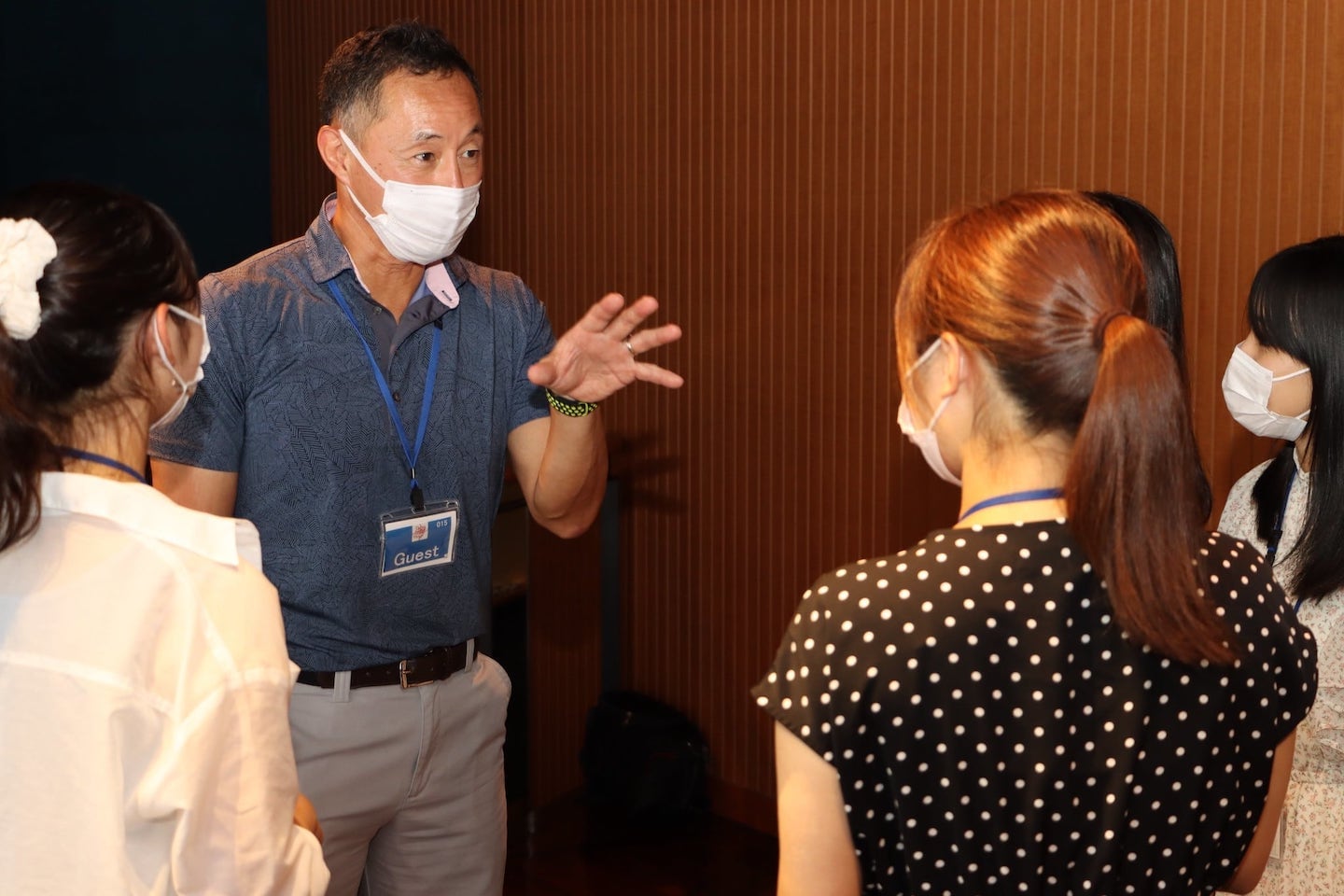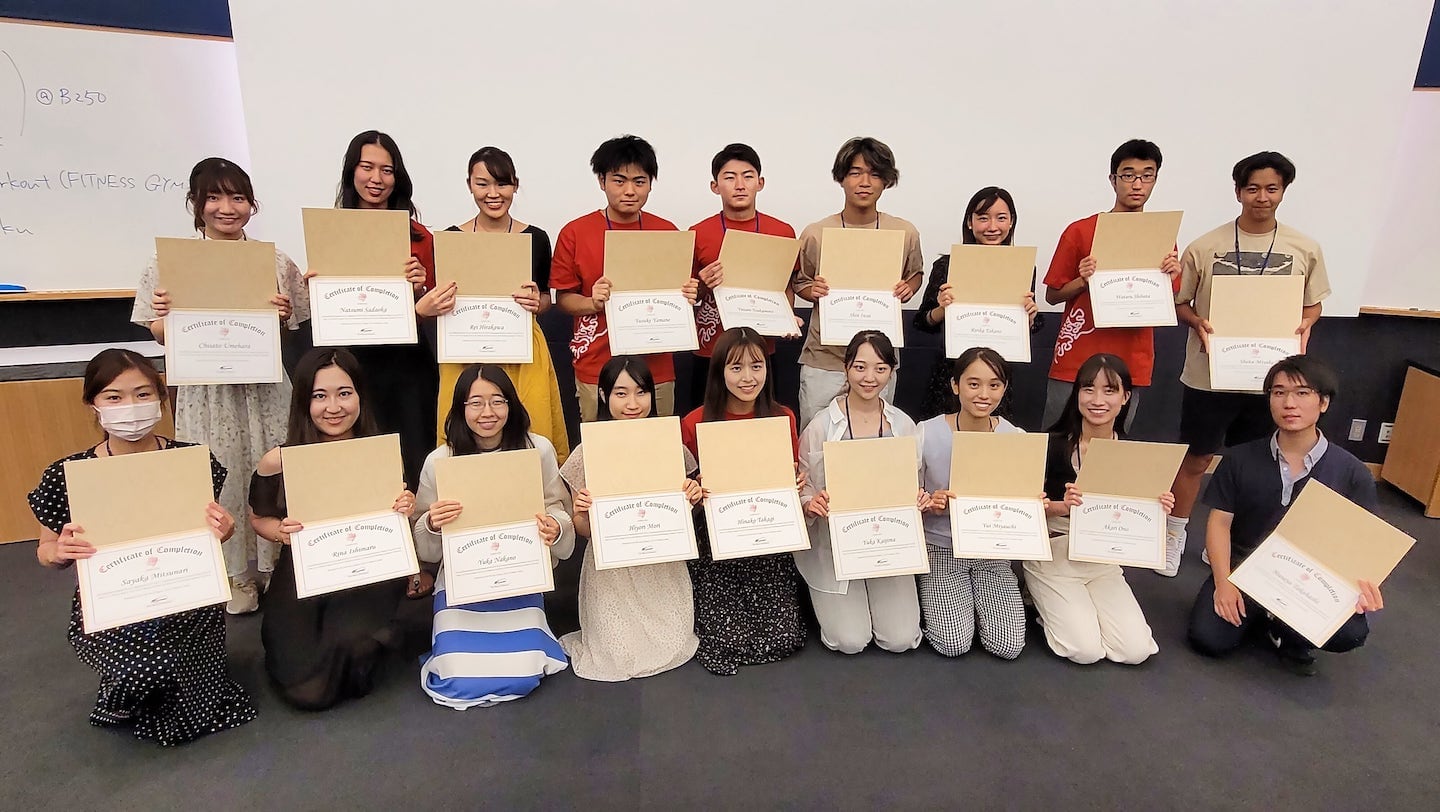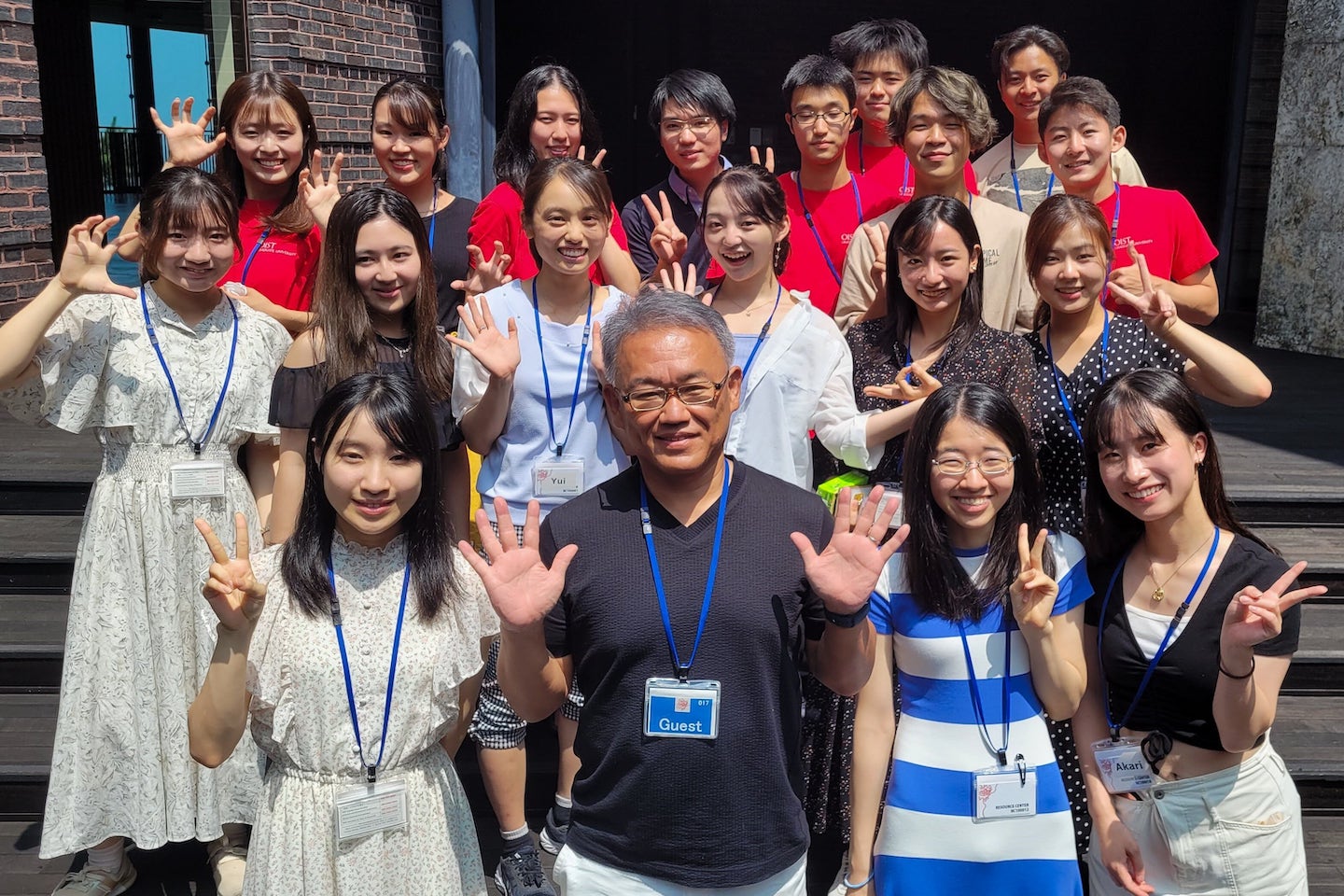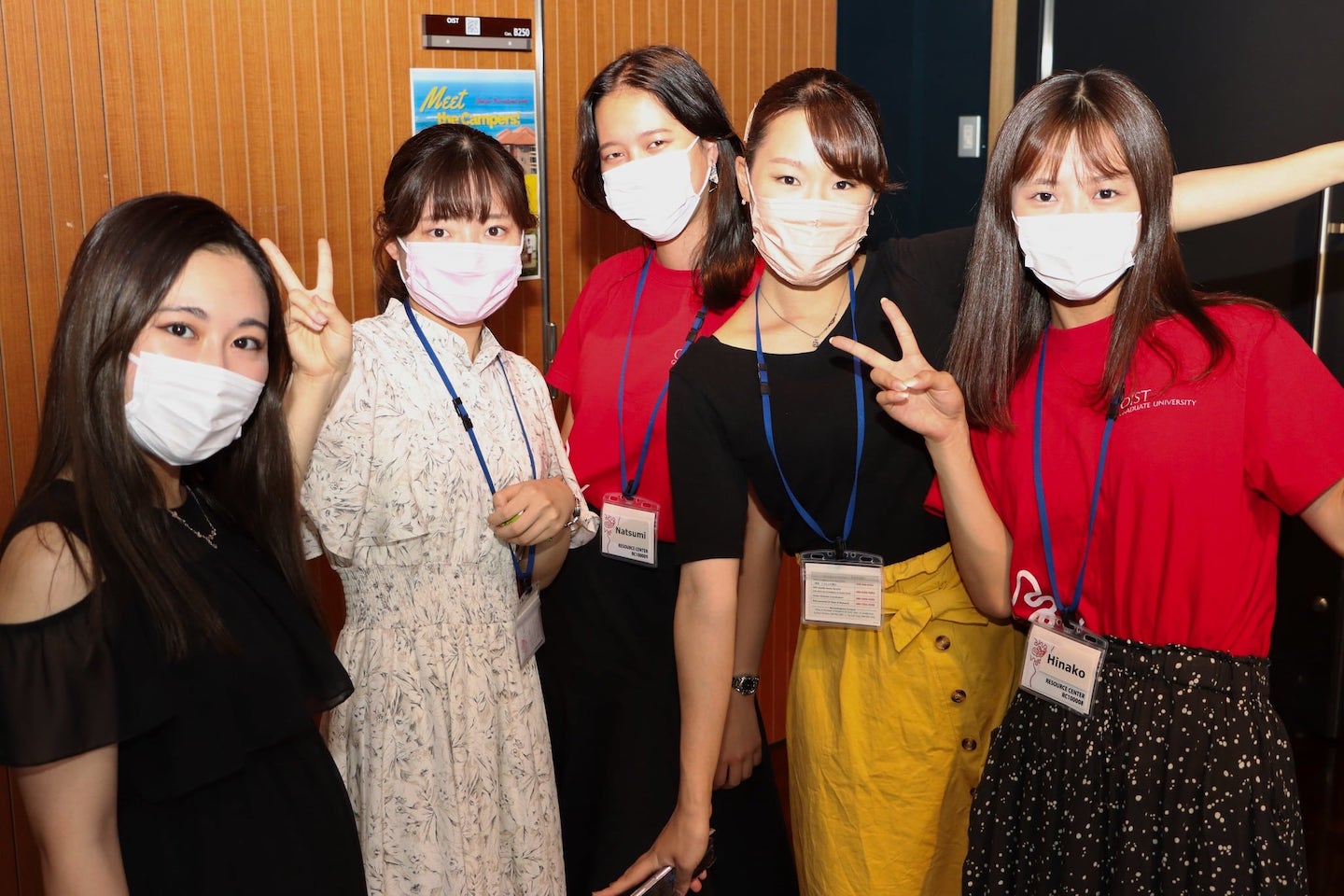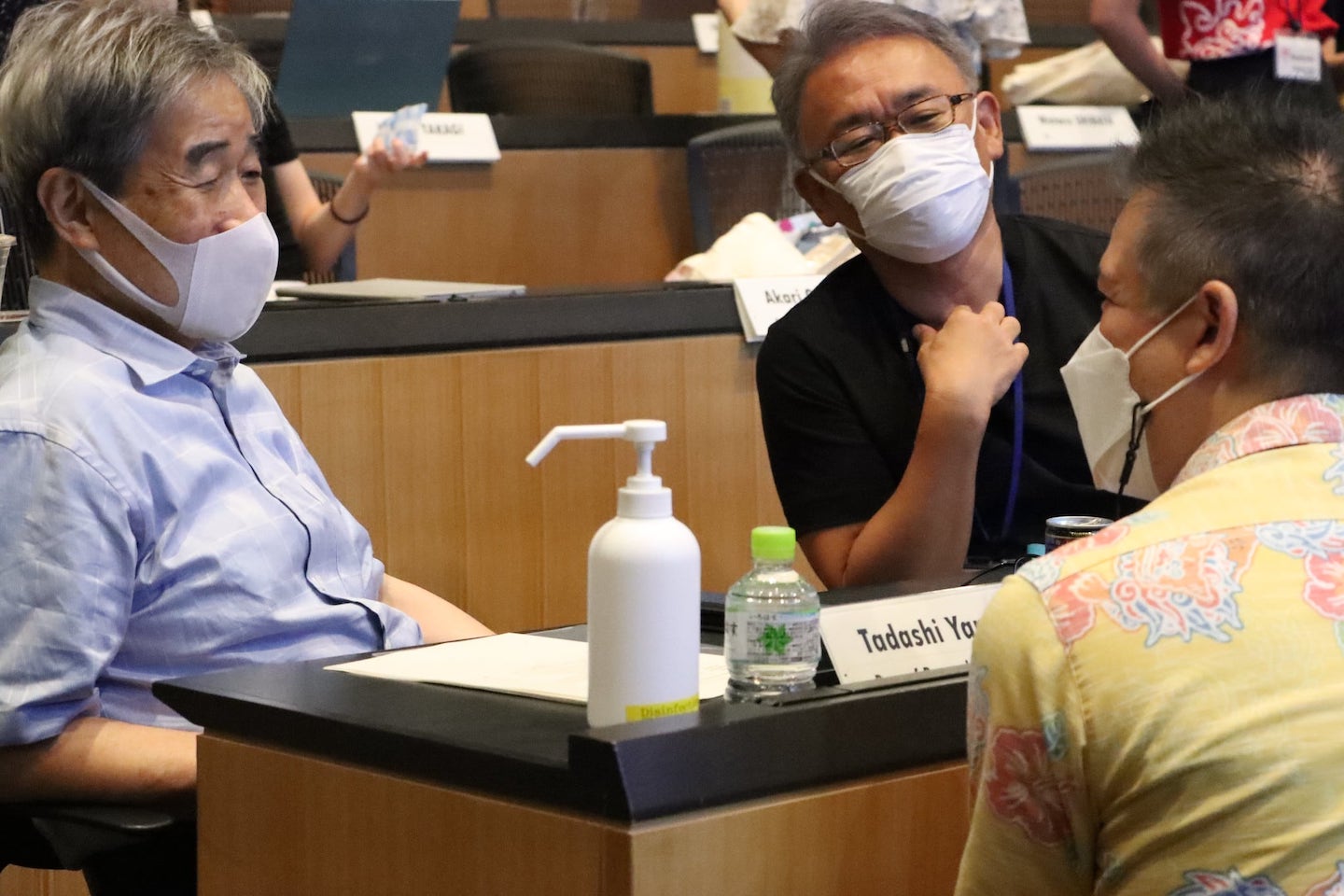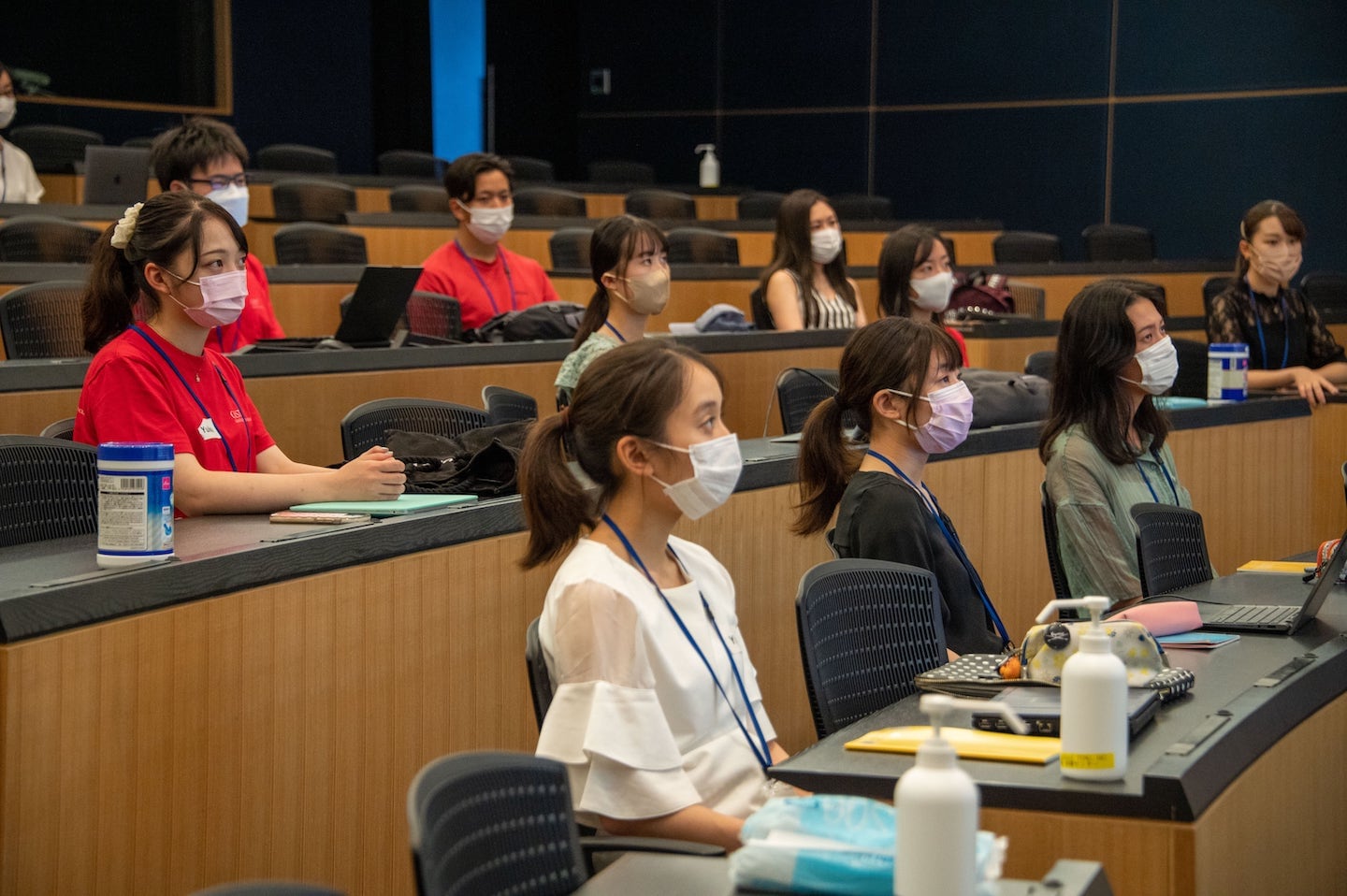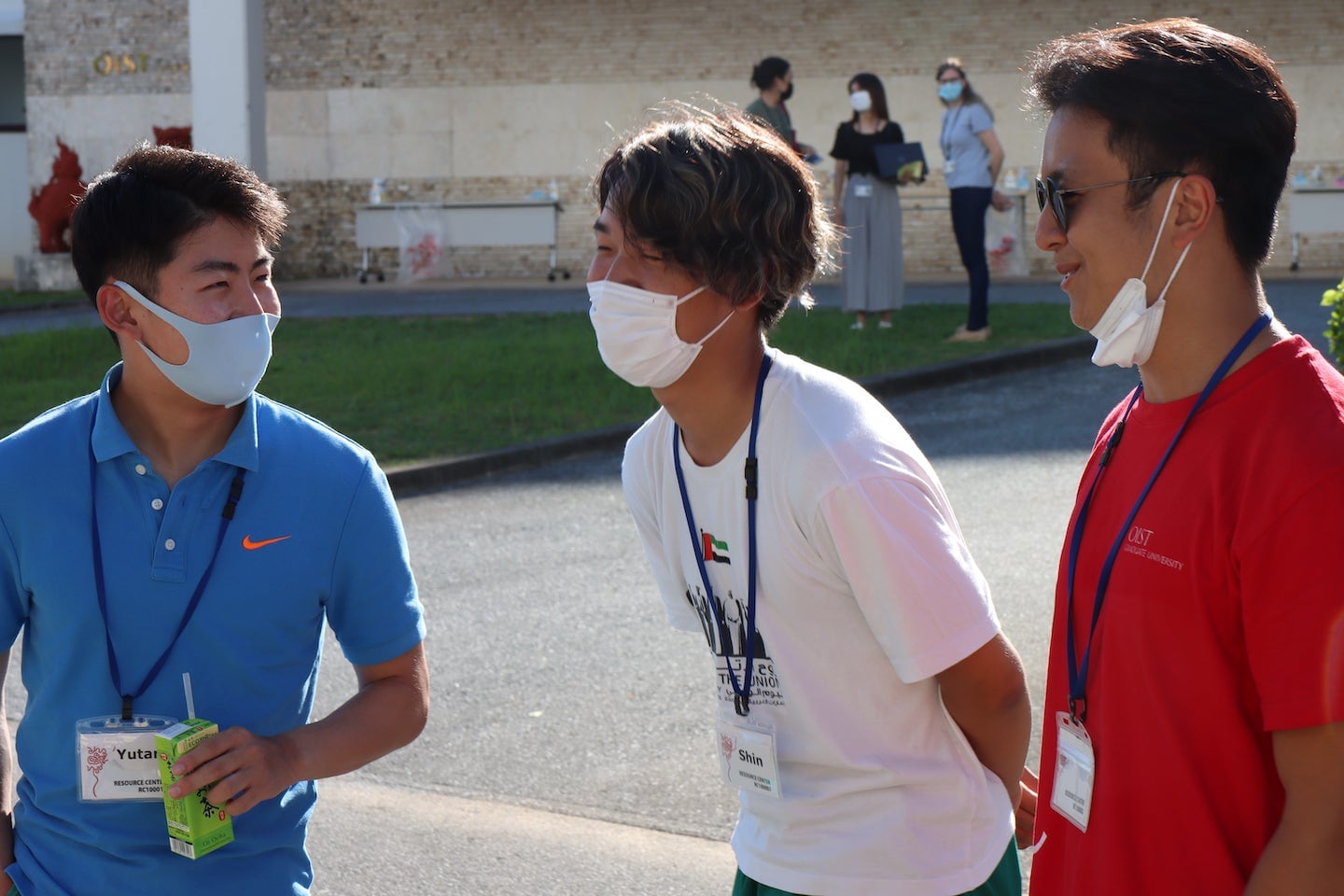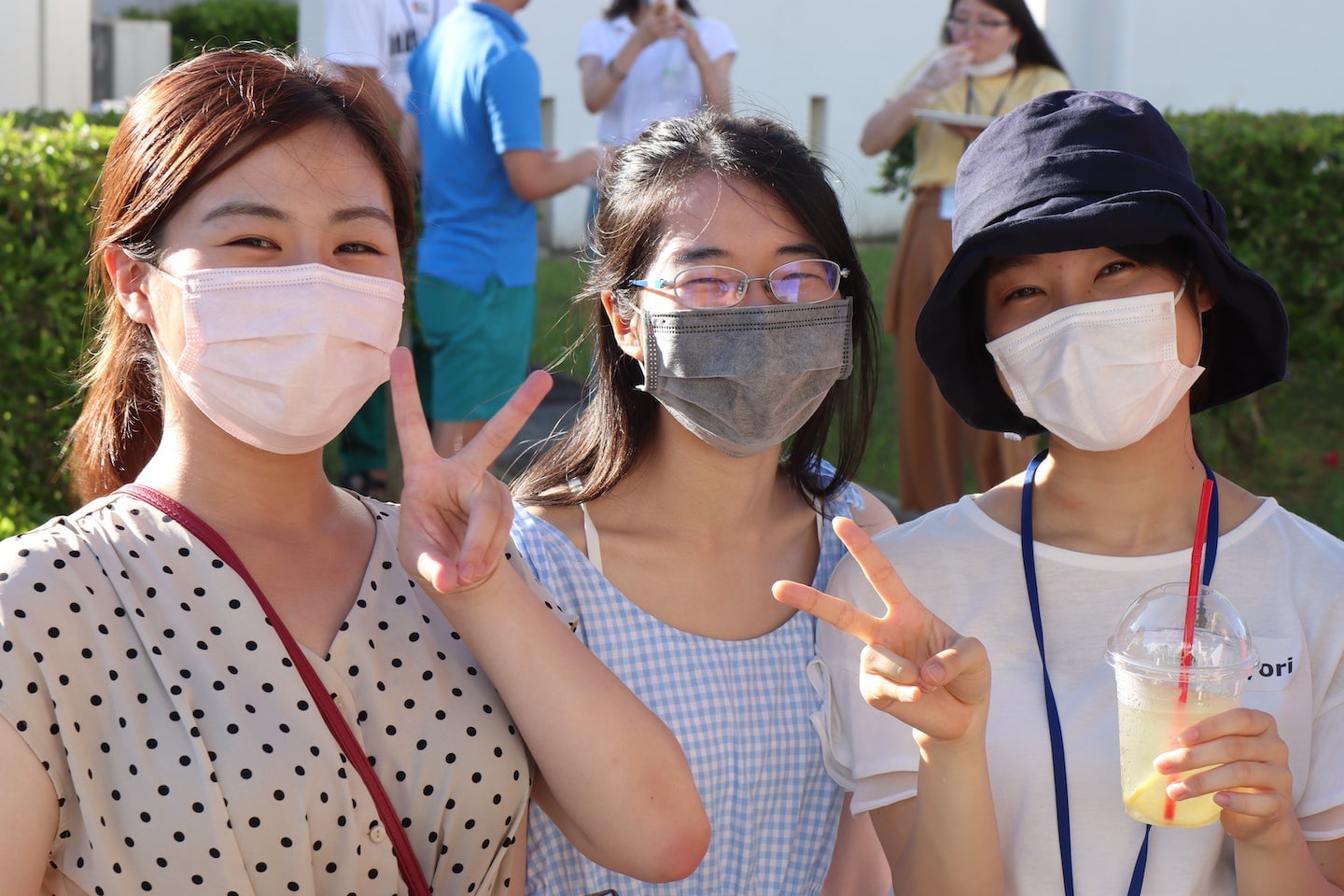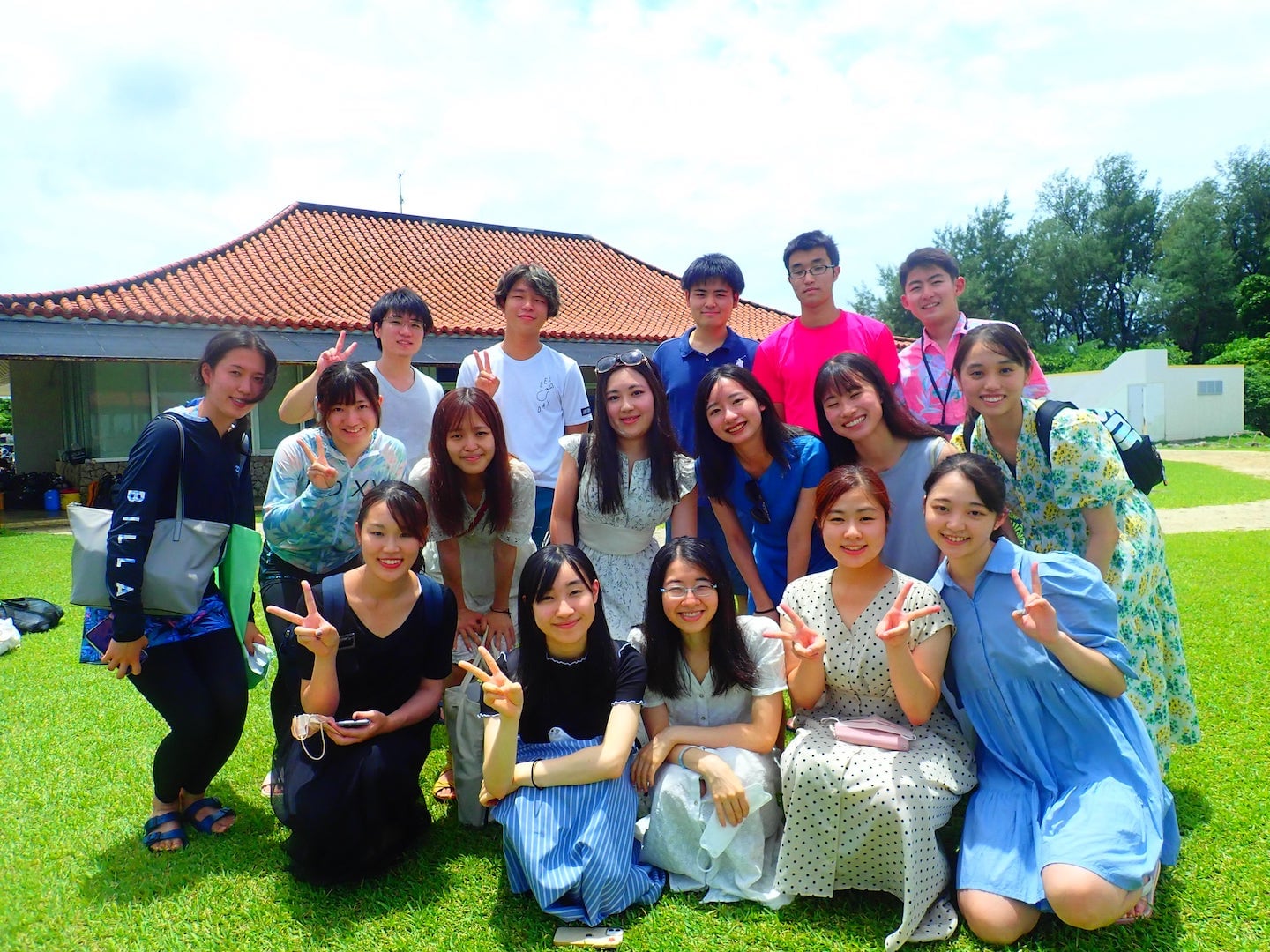
A STEM Summer in Okinawa, soaked in research, culture, and teamwork
This summer, OIST (Okinawa Institute of Science and Technology Graduate University) welcomed 18 medical students from the KEIO University School of Medicine, one of OIST’s strategic partners. The 18 “campers” spent 10 days participating in basic research in a variety of disciplines at a cutting-edge research institute in scenic Okinawa, a semi-tropical island in southwestern Japan.
Dipping a toe into Okinawan culture
The inaugural day of the camp began with an important contribution toward OIST’s continuing commitment to Okinawa, by planting coral seedlings in the Okinawan Ocean. OIST aims to be the partner of choice for innovation in Okinawa, acting as a catalyst to promote economic growth and sustainable benefits to address problems that are critical to Japanese society and the world.
Participation in the coral reef project further served as a reminder to the campers, who may not have time to dwell upon environmental issues in their busy lives as medical students. The conservation and restoration of coral reefs is a global issue. The dive was also essential to imparting a sense of the challenges facing Okinawa—where the students would be making their home for the 10-day duration of the summer camp—as well as introducing them to OIST’s efforts to combat significant environmental issues in Okinawa and the world.
This cultural immersion continued throughout the camp. Besides the beautiful ocean, Okinawa is blessed with the bounty of wonderful people and culture. While their extracurricular activities were limited by the camp’s core purpose of exposure to basic research, the students did enjoy an after-school class on the Sanshin, a traditional Okinawan instrument.
After learning about the history of the Sanshin and Okinawan music, the campers were finally able to play a song with the help of their instructor, Ms. Satsuki Agena. At the end of the class, the campers danced to a fast-paced Okinawan folk song called “Kachashii.” The class started with the setting sun, and before we knew it, it was already dark.
An immersion into basic research
At the inaugural ceremony, Professor Nick Luscombe, the Dean of Research at OIST, told the campers, “I want you to experience life as a researcher. I have made friends all over the world by continuing my research. I met a researcher at a conference in a foreign country long ago when I was a post-doc, and I met him again at OIST, and we became colleagues, friends, and members of the same faculty, here in Okinawa.”
With these inspiring words ringing in their ears, the 18 campers set off toward the labs to begin their practical training in the field of basic research. The students were distributed among 17 research units, and each student was assigned a Scientific Supervisor to guide them. As part of their research training, the students assisted in experiments, analyzed DNA sequencing results, and participated in discussions with the machine learning team.
Commenting on the camper assigned to his unit, Professor Tadashi Yamamoto said, “She is very keen to learn. She comes to my office often with many questions, some of which are incisive questions for a person who has not studied in this field.”
One of the scientific supervisors, Dr. Charlotte Capitanchik, who took care of two campers and taught them the DNA sequencing of Oikopleura dioica, said, “They were so surprised by the result, as it was not what we expected.”
As a result of this experience, some of the campers are already applying to the PhD program at OIST. It would be wonderful if the basic research training in OIST’s research units is successful in expanding their future options.
Camping through the pandemic thanks to the volunteers’ and PIs’ dedication—a story of teamwork
The summer camp took place during Japan’s 7th wave of COVID-19. As preparation was underway, the numbers of those testing positive for COVID-19 in Okinawa was increasing at a rapid pace. Worried, OIST considered postponing the camp again. However, ultimately, we decided to move forward with the program, so that the interested MD students would not miss out on this precious experience. Once they move into their third year, MD students must dedicate their time to clinical studies and practice in the hospital.
A major portion of the success of the camp is attributable to our dedicated team of volunteers, which comprised PhD students, post docs, and the administrative staff. The volunteer team gathered weekly to develop their ideas into an attractive and comprehensive program. Credit is also due to the 18 principal investigators (PIs) who stepped forward to take a camper into their research unit and appoint a Scientific Supervisor to ensure that the campers’ time in their units would be fruitful and fulfilling.
Cross-sectionally, many OIST administrative divisions and sections collaborated to ensure the triumph of the camp. The Graduate School, the University Community, Child & Youth Service, Communications and Public Relations, Buildings and Facility Management, Information and Technology, among others—all of OIST supported this camp so that the campers could be safe, happy, and focused.
This is one of the strengths of OIST—team work—which comes from OIST’s unique set of core values: Excellence, Respectfulness, Responsibility, Transparency, Sustainability, Diversity, Courage, and Freedom.
Instilling the values of gender, diversity, and inclusiveness
The educational experience at OIST would be incomplete if it did not include insights into the challenges of being researchers and leaders in an evolving, global STEM ecosystem. The students were also exposed to humanities subjects, such as research ethics, scientific writing and manuscript preparation in English, English-language presentation skills, gender, diversity, inclusion, and more.
According to the UNESCO Institute of Statistics, less than 30% of the researchers in the world are women. OIST has been striving toward reducing that gender gap. 12 out of 18 campers at the summer camp were female. These are the STEM leaders of the future. Through a series of lectures and discussions with OIST professors, Dr. Gail Tripp and Dr. Christine Luscombe—who are seasoned, successful scientists, educators, and mothers—the campers were given a perspective on the factors that deter women from pursuing careers in STEM, as well as insights on how to identify and tackle these challenges.
In the subsequent group discussions, the campers created a lasting impression with their thoughtful and serious approaches towards the challenges that might face them as they pursue careers in research and medicine, their ideas on how to overcome these challenges, and their theories on how they could support their spouses who may, themselves, be active members of the STEM community. At the end of the session, each group presented what they considered the barriers in STEM that perpetuate gender gaps, such as gender stereotypes, male-dominated cultures, the paucity of role models, etc.
Drs. Tripp and Luscombe, who embodied their own advice, encouraged the participants with the words “Your gender shouldn’t be allowed to define the choices that you make about family and career. You can be anything you set your mind to be!” The campers frequently sought opportunities for one-on-one discussions with these role models at OIST.
Finale—the challenge of a 3-minute pitch in English
On the last day of the camp, the campers were required to make a short presentation—a 3-minute pitch in English. Campers were asked to prepare the pitch to show what they learned or experienced during the camp and to present it to a live audience in the Sydney Brenner Lecture Theater. OIST took this last event very seriously. We invited Dr. Toshiaki Monkawa, the Vice Dean of Keio Medical School, and Mr. Tatsuo Kawasaki, the donor who supported the camp and an alumnus of Keio University, Founding Partner and Representative Director of Unison Capital, Inc., as well as a trustee of OIST. The campers were not informed that their Vice Dean was coming until the last minute. The idea behind this decision was that a surprise can be a good way to break the tension and relieve the pressure!
Although we had reservations that the students might be nervous or unable to prepare their slides in time, we were soon disabused of this notion. All the campers gave a precise, well-structured, and confident presentation that captivated the audience.
The challenge of a 3-minute presentation lies in packing the entirety of one’s research into a concise message that is clear enough for audiences to digest without any engagement with the speaker—a task that is far more complicated than a 35-minute presentation. Despite having only a short time to prepare, the campers did an exemplary job. We congratulate them all!
To add to the excitement of the final day, OIST developed a strict rubric by which to judge the pitches. The three Deans, who joined as judges—Dr. Tadashi Yamamoto, the Dean of Research, Dr. Milind Purohit, the Dean of Faculty Affairs, and Dr. Ulf Skoglund, the Dean of the Graduate School—Dr. Toshiaki Monkawa, the Vice Dean of Keio Medical School, Mr. Tatsuo Kawasaki, the donor, and Dr. Gretchen Jones, the senior manager of OIST’s PhD program, each completed their scoring separately.
While the judges were arguing about who would get the first prize, the campers had a great time with Mr. Kawasaki.
As a judge, Mr. Kawasaki inspired the campers with the following words, “A good leader, whether in science, business, or medicine, is someone who influences and motivates others. In order to do that, your ability to communicate plays an important role. What you experienced at the OIST summer camp will definitely be a positive factor in your future career.”
Future STEM leaders to guide an uncertain world
The 10-day adventure blew past like a swift, summer breeze. The campers who left the camp were a far cry from the subdued and reserved students who had participated in the opening ceremony. Some of them proactively sought appointments to speak with OIST professors. Others showed leadership by guiding other campers to the right place. A few of the campers decided to apply for a research internship. Some campers even formed friendships with OIST researchers.
When the camp concluded, OIST and Keio University signed an MOU, the Agreement on Scientific and Academic Cooperation. The purpose of this partnership will be to contribute to the advancement of science and technology through collaboration and cooperation in a spirit of mutual reciprocity.
Through this agreement, OIST and Keio will expand their collaboration, both within and beyond medicine and the life sciences. To kick-start this expansion, the Keio Medical School and OIST are currently working on a “Long-term Research Internship” project, which will allow medical students from Keio University to experience OIST research on a long-term basis, for credit.
The advancement of science and technology cannot be accomplished without future STEM leaders. We, OIST, and Keio University will continue to support their development.
We are already looking forward to welcoming the next cohort of campers!




